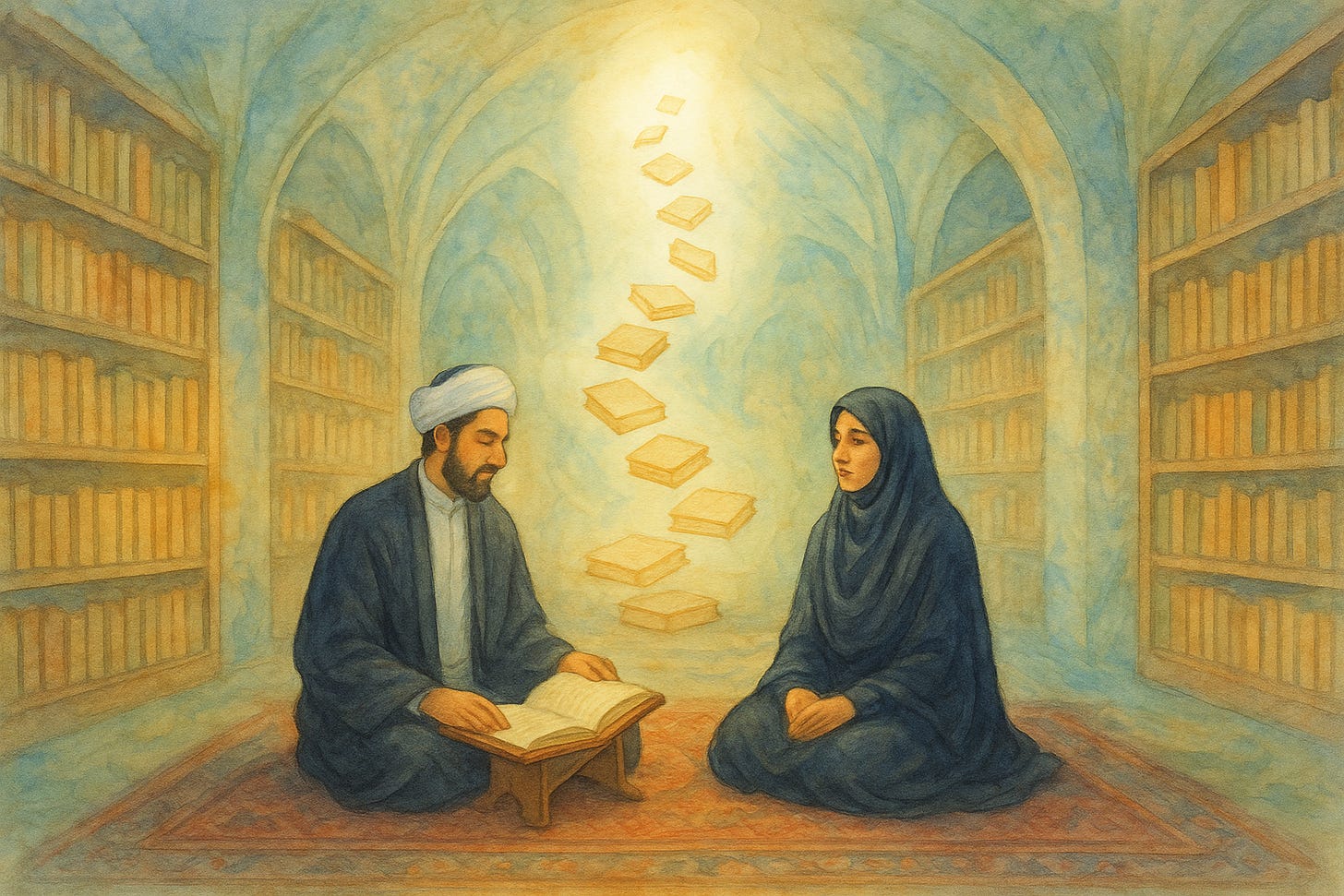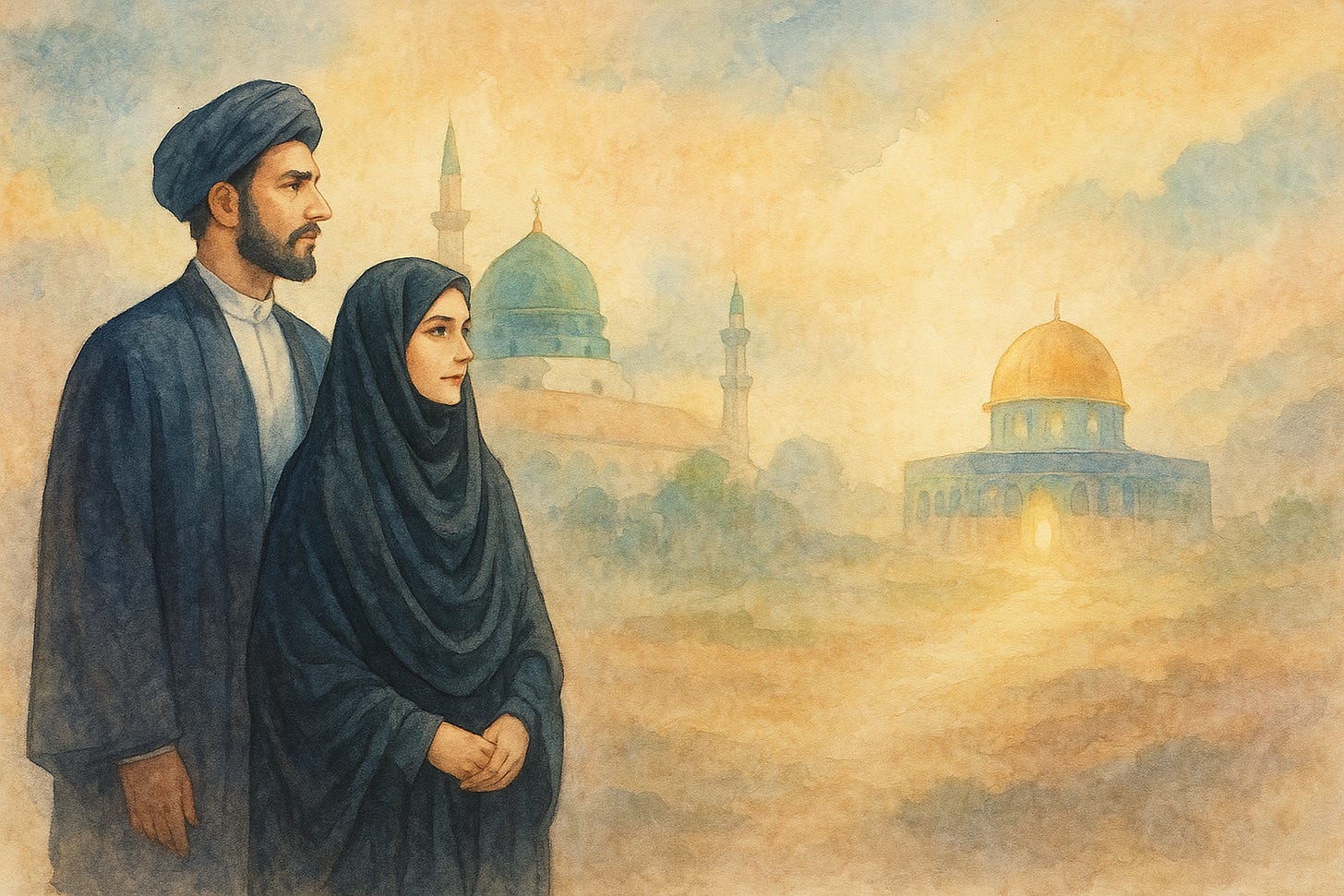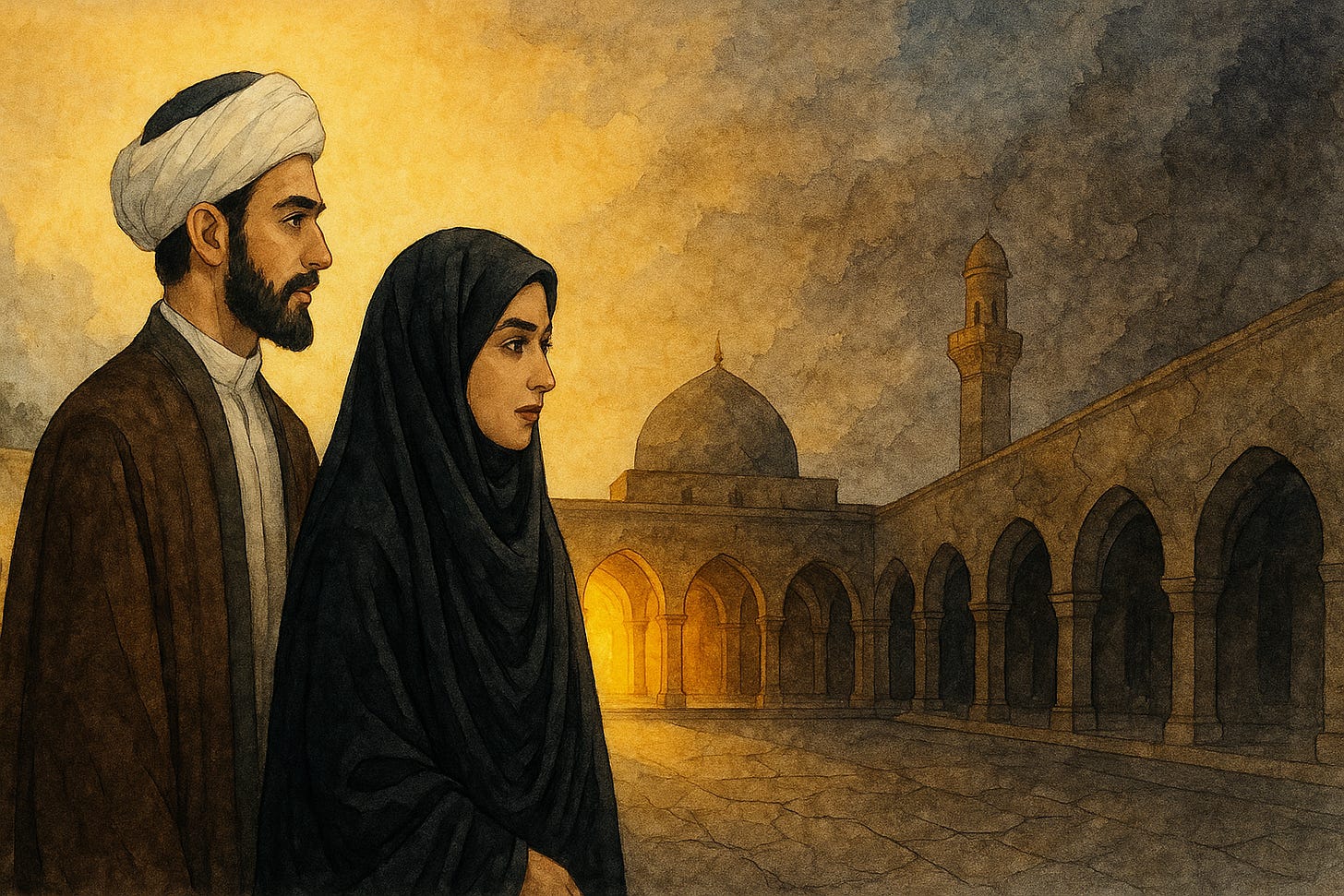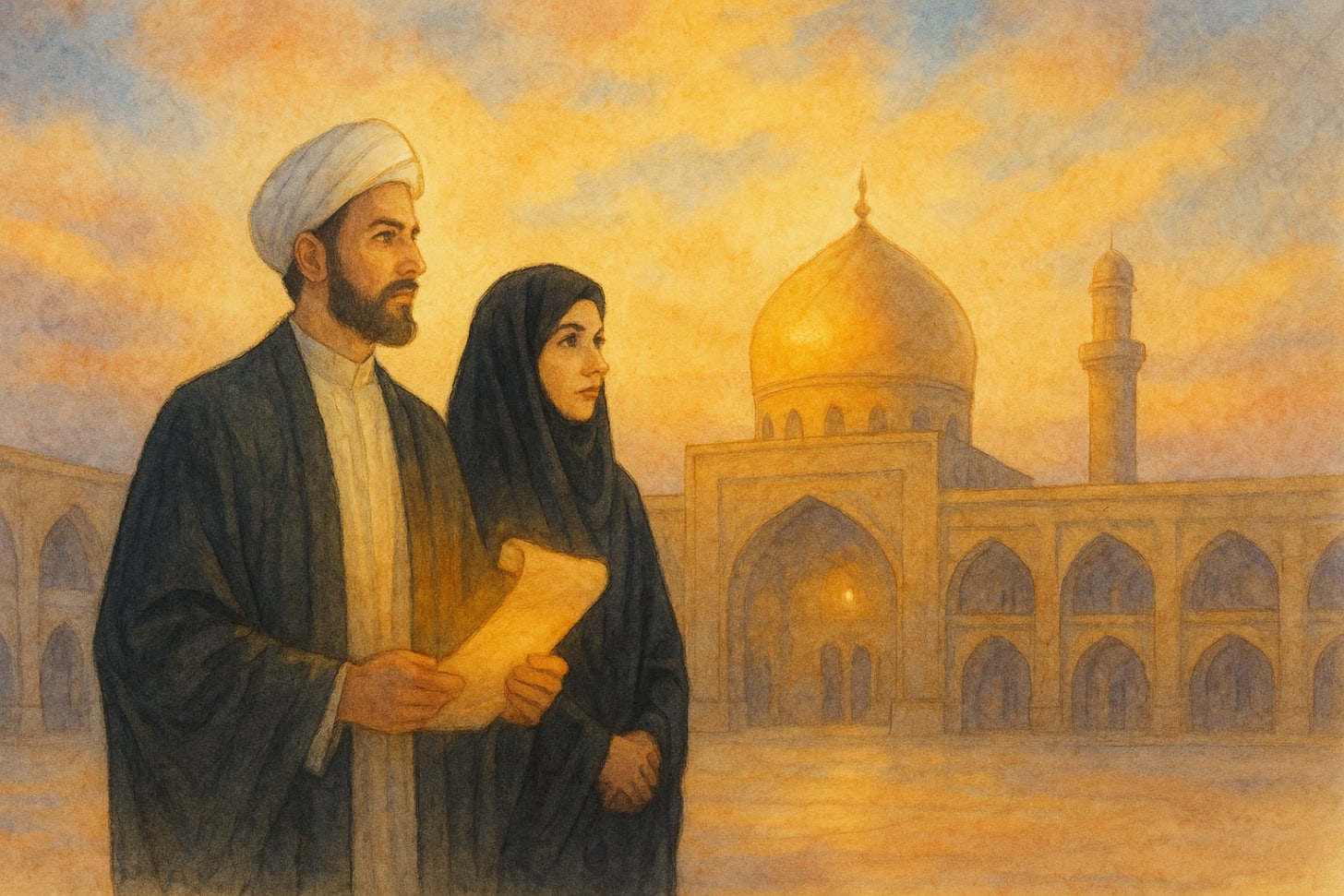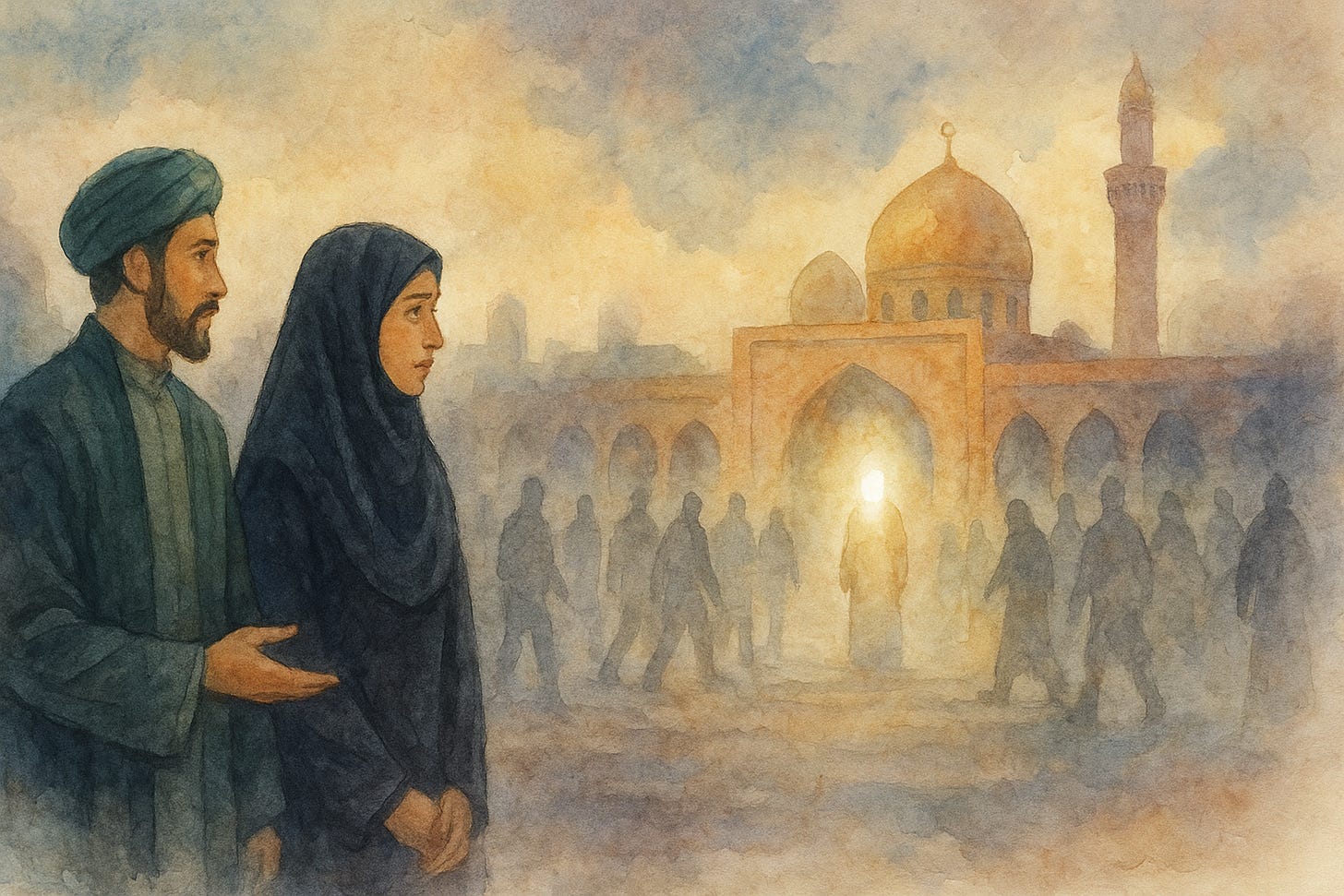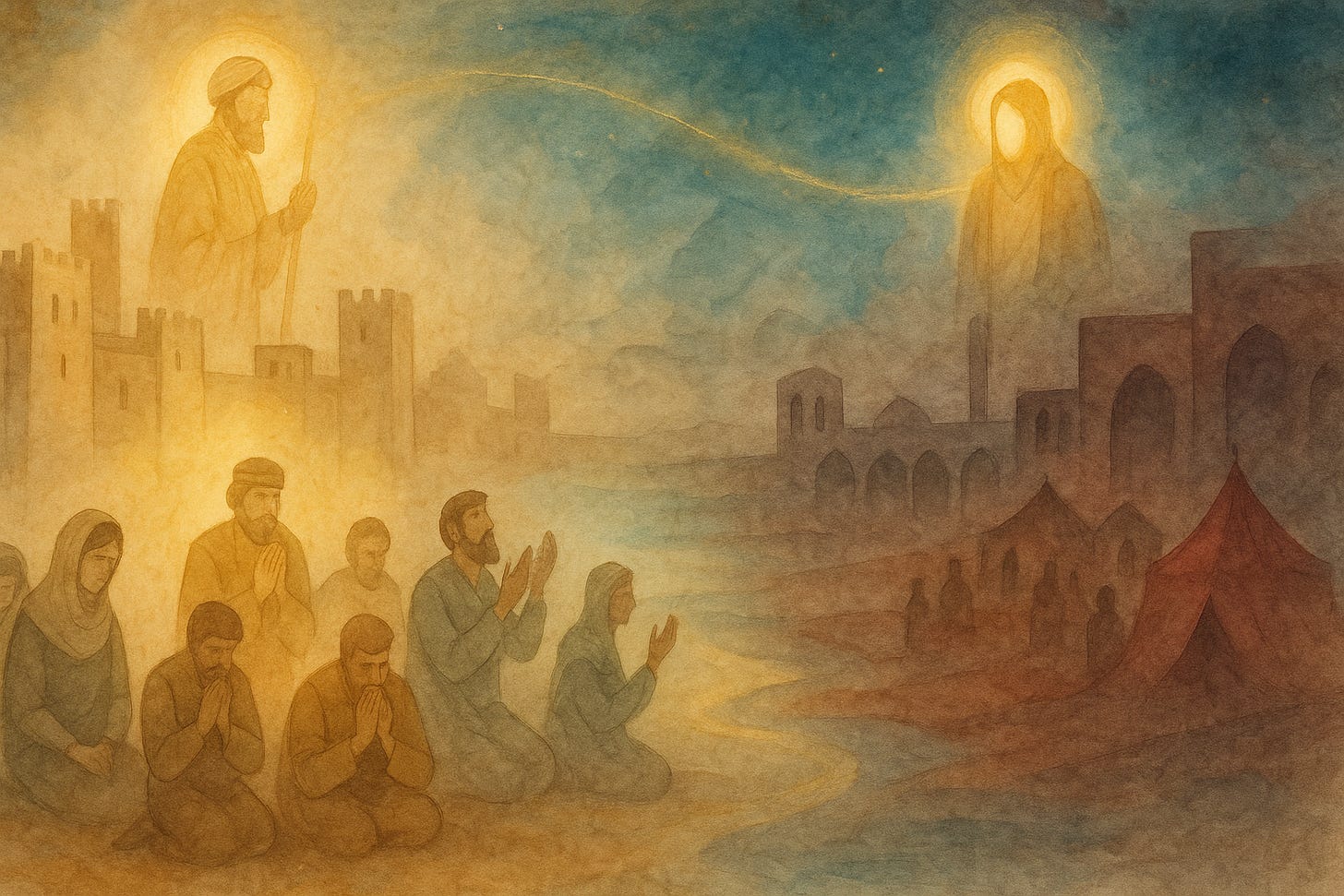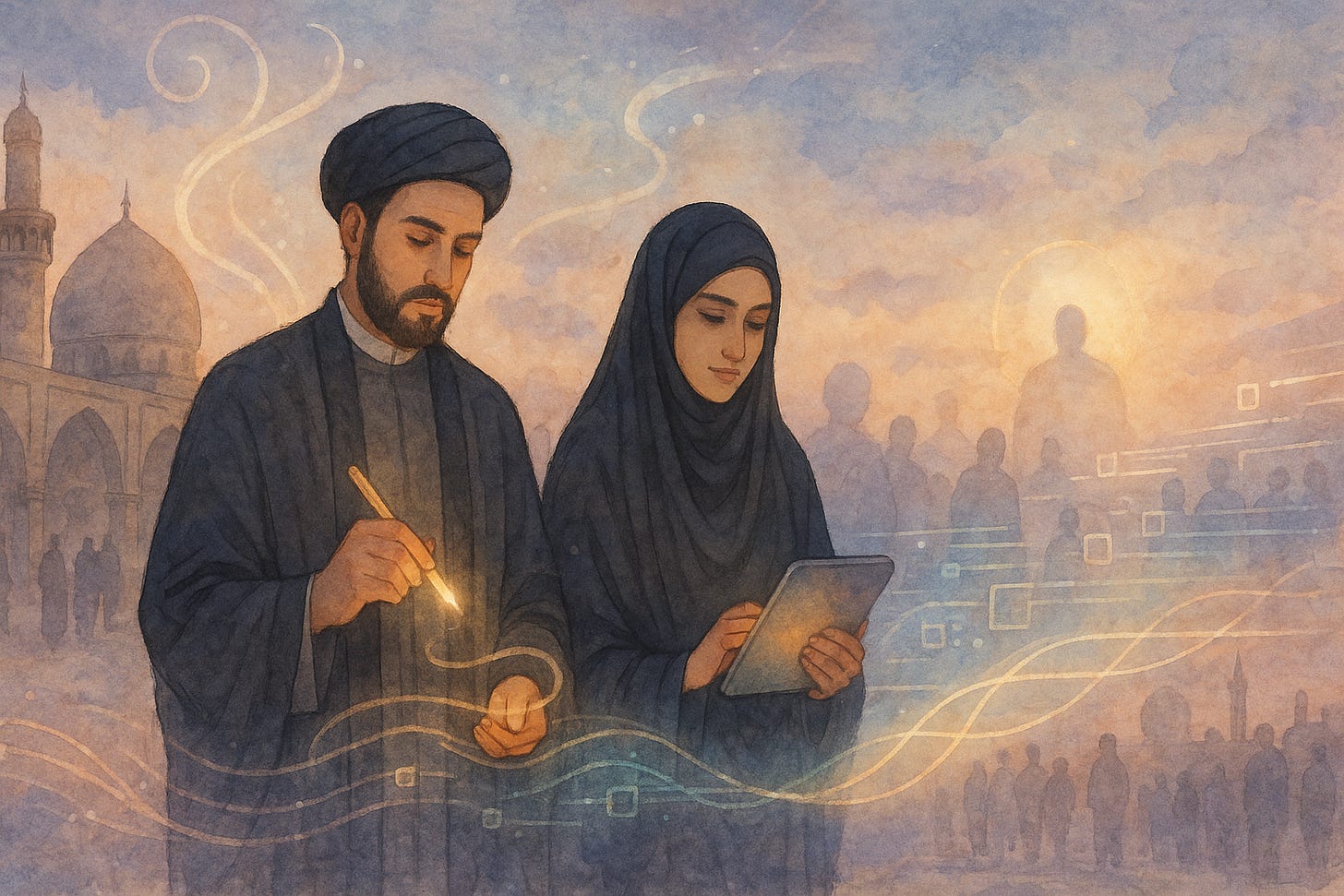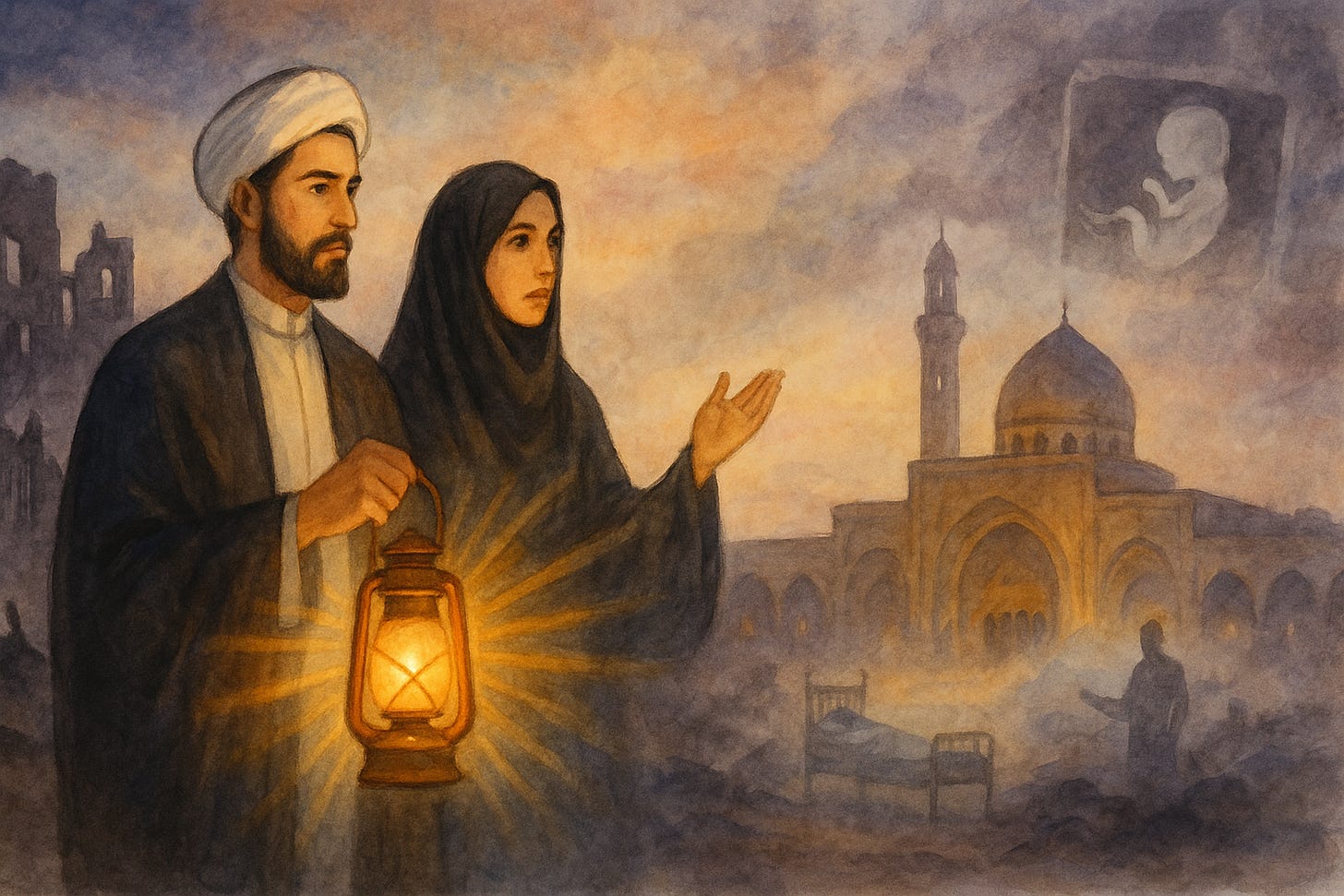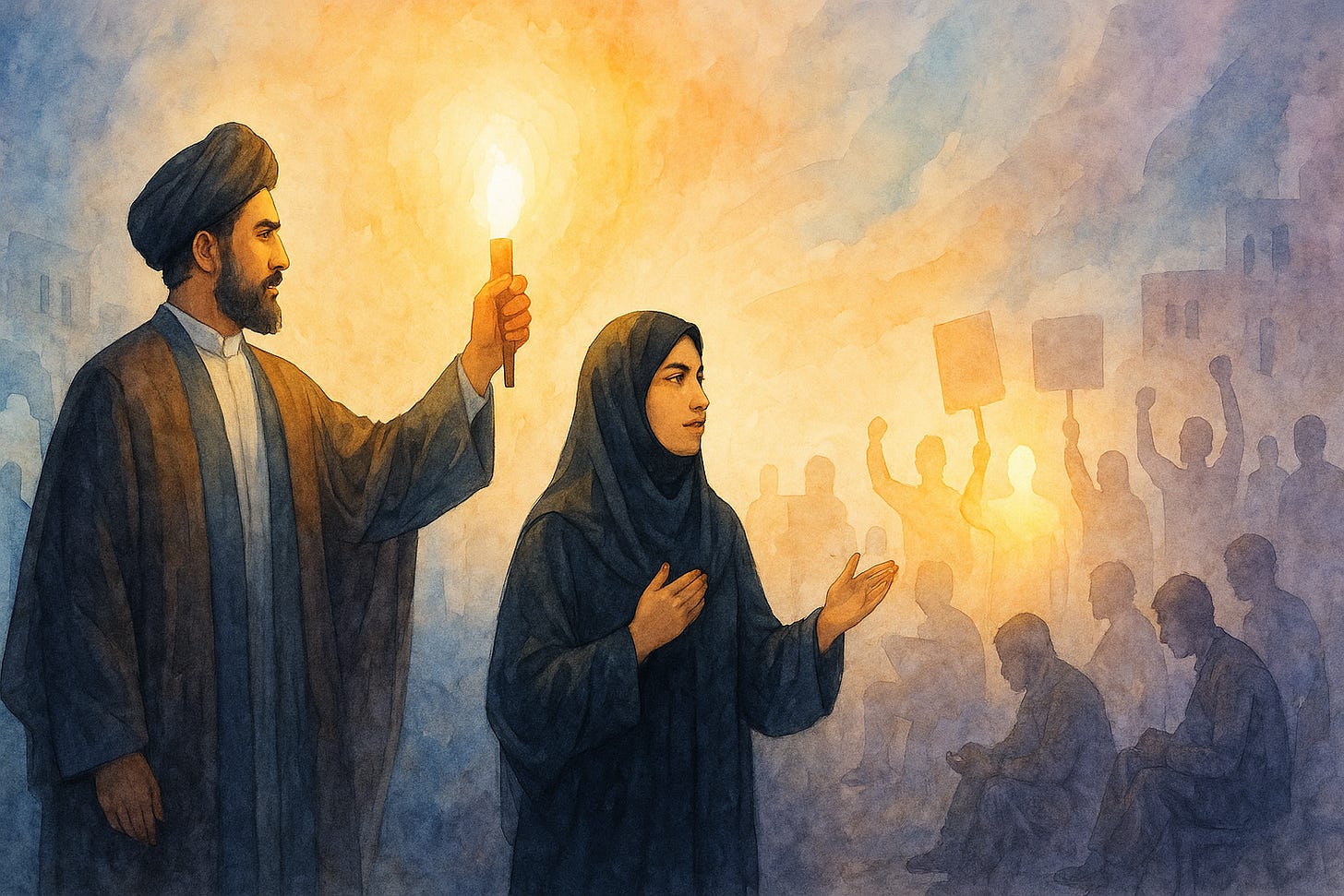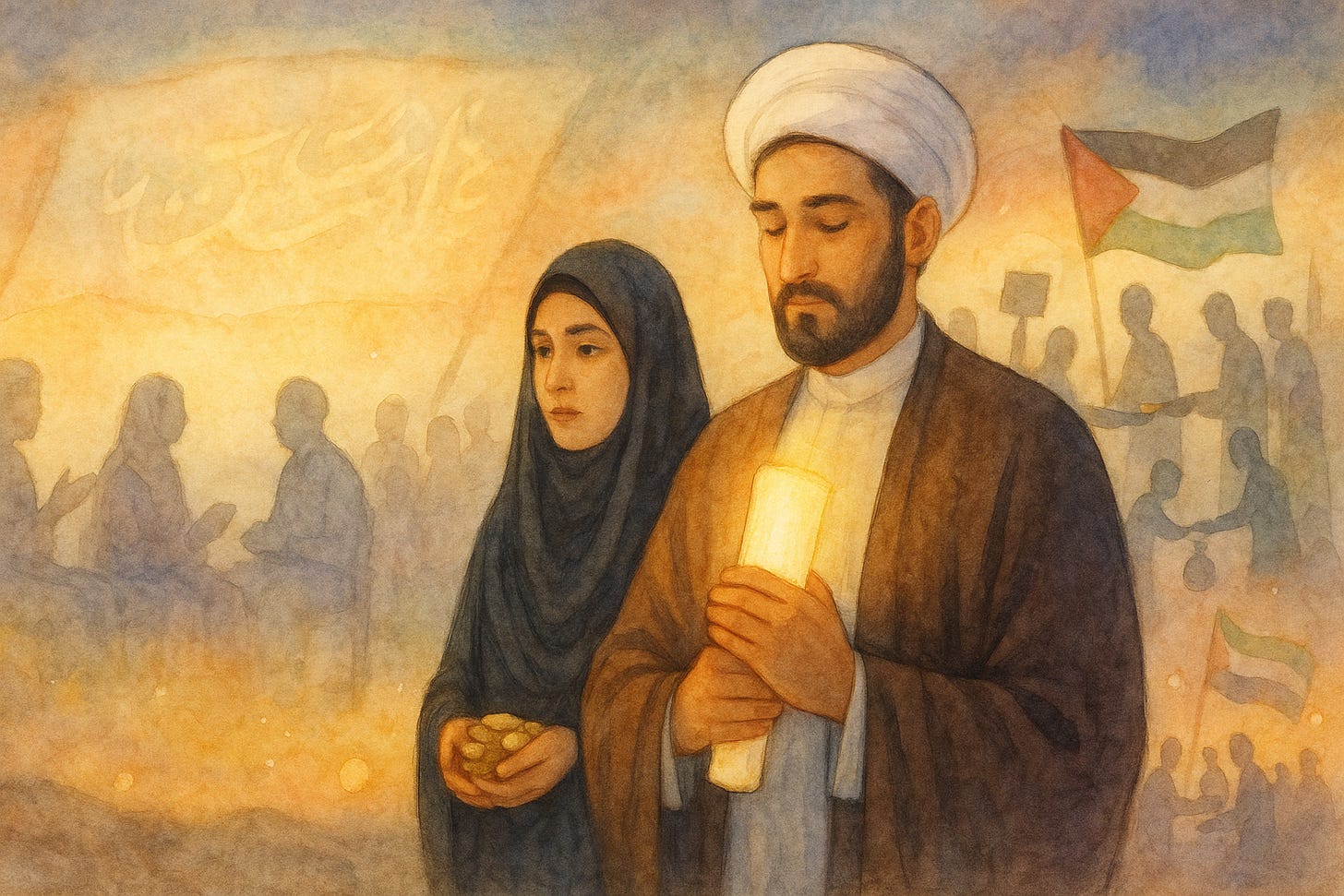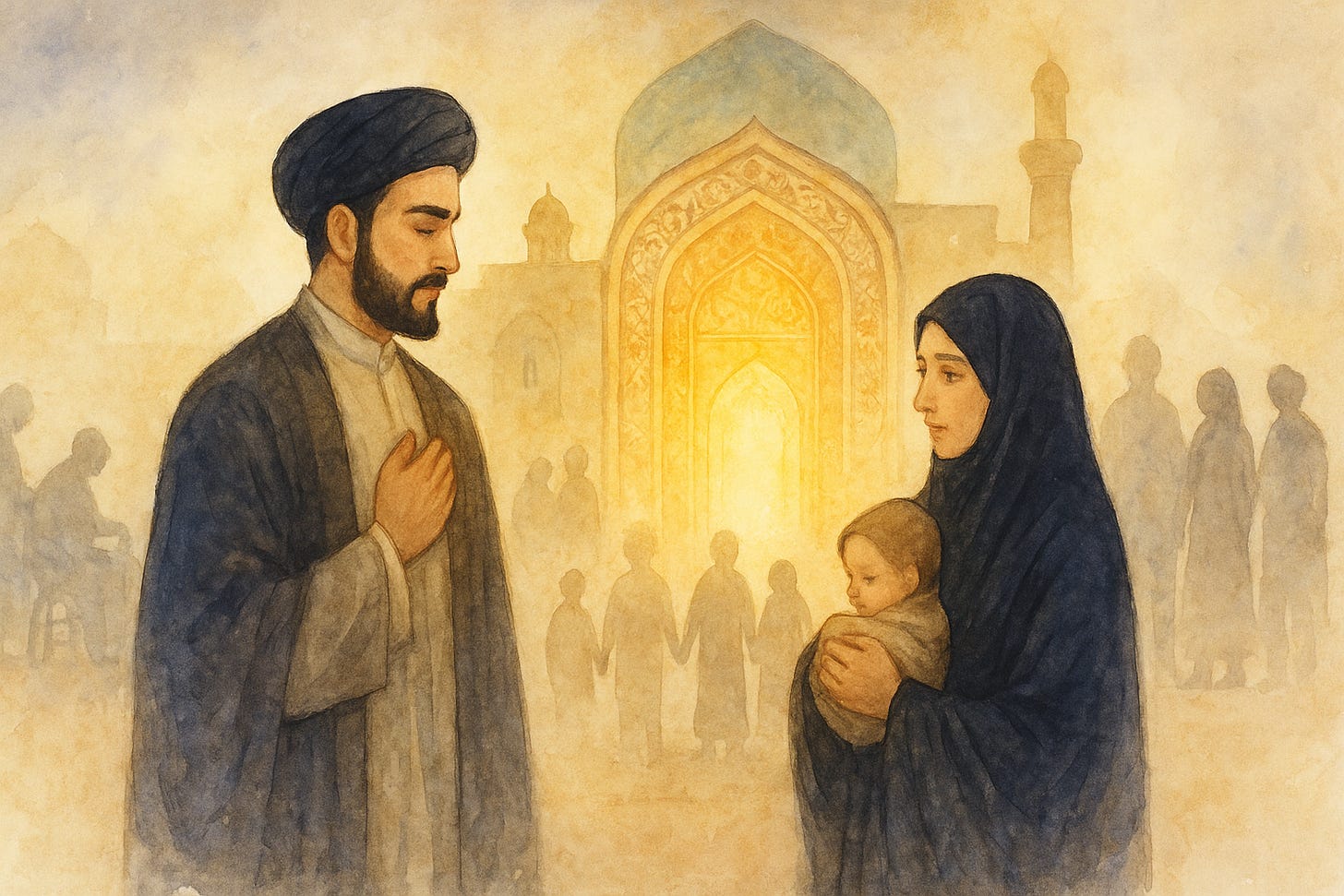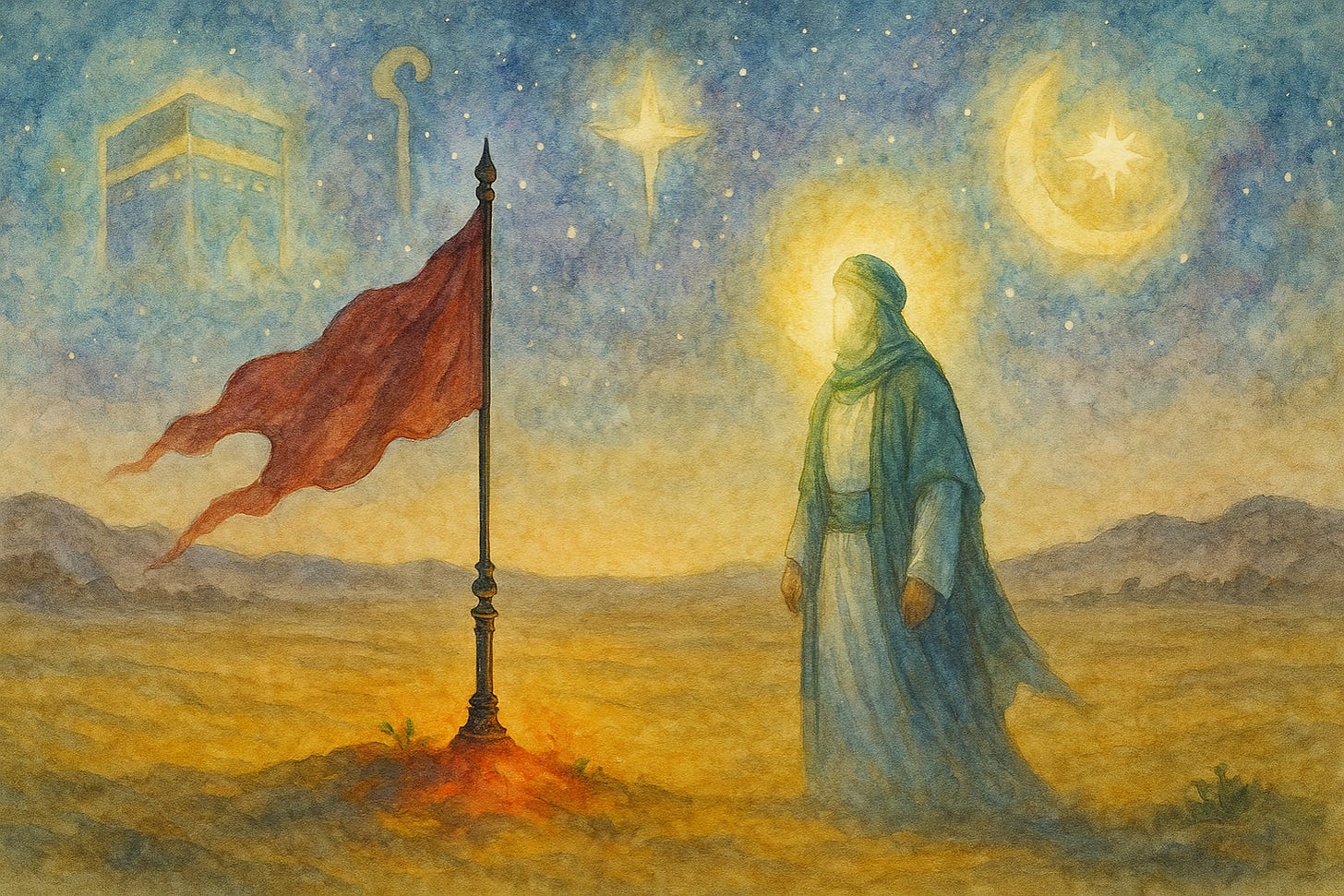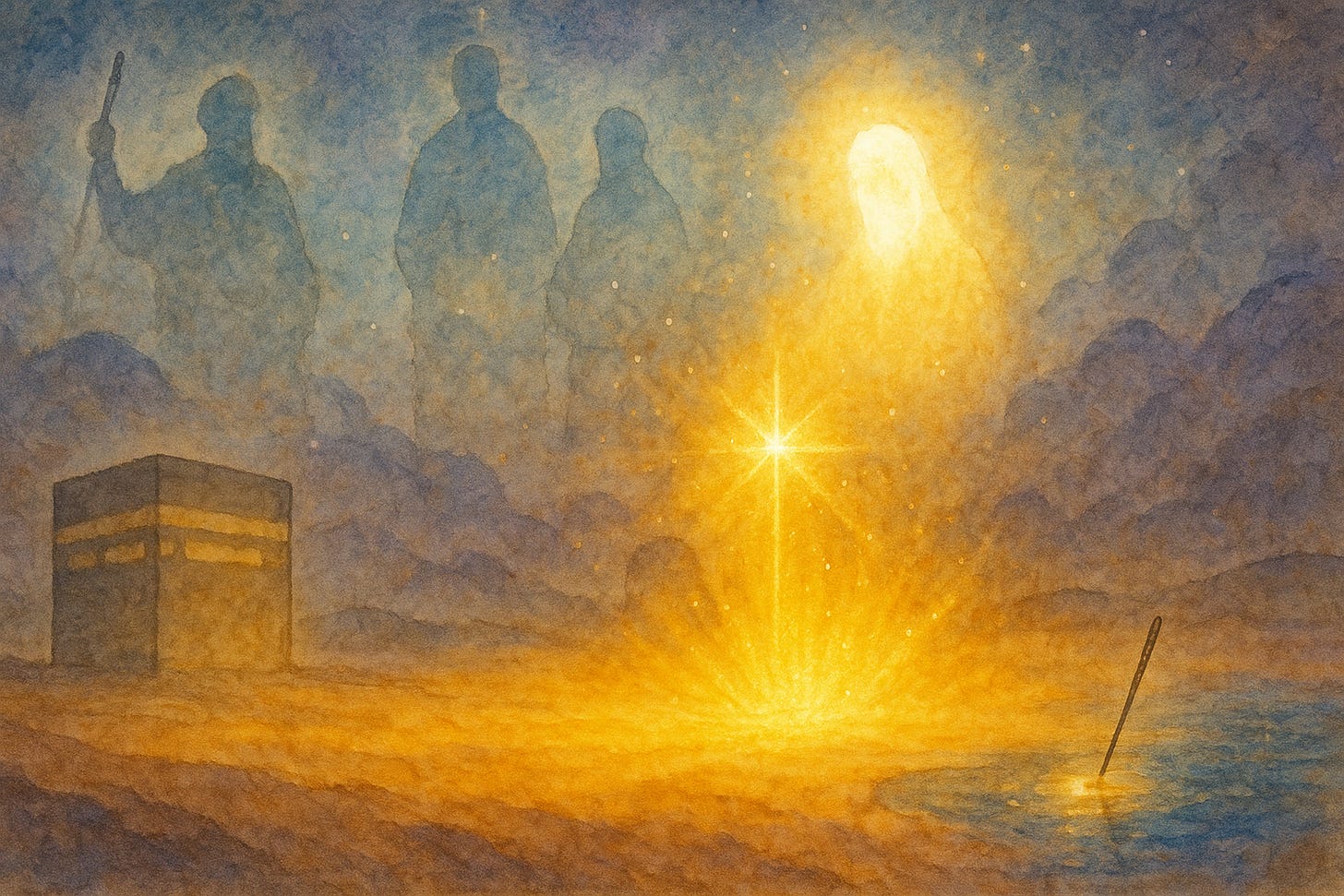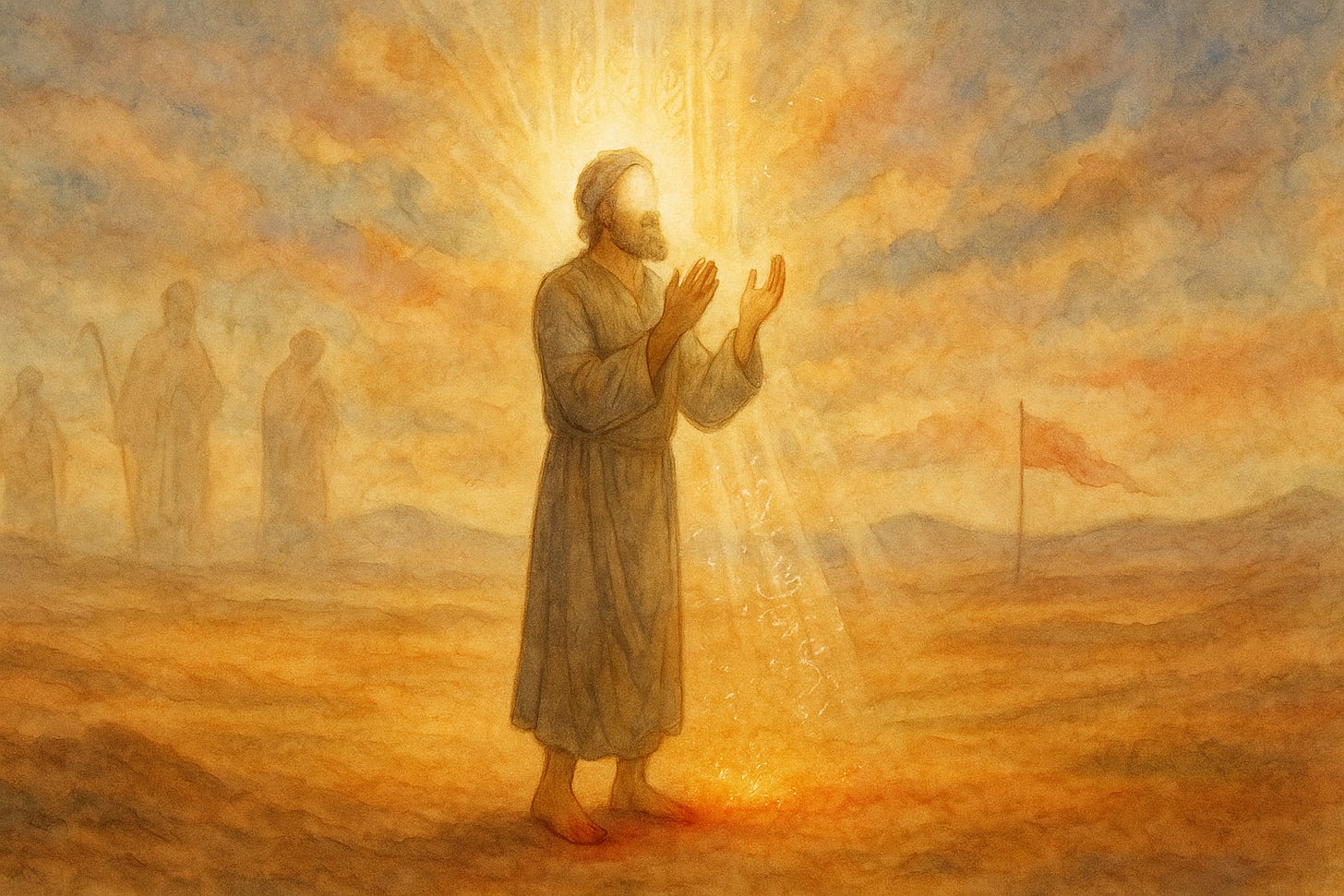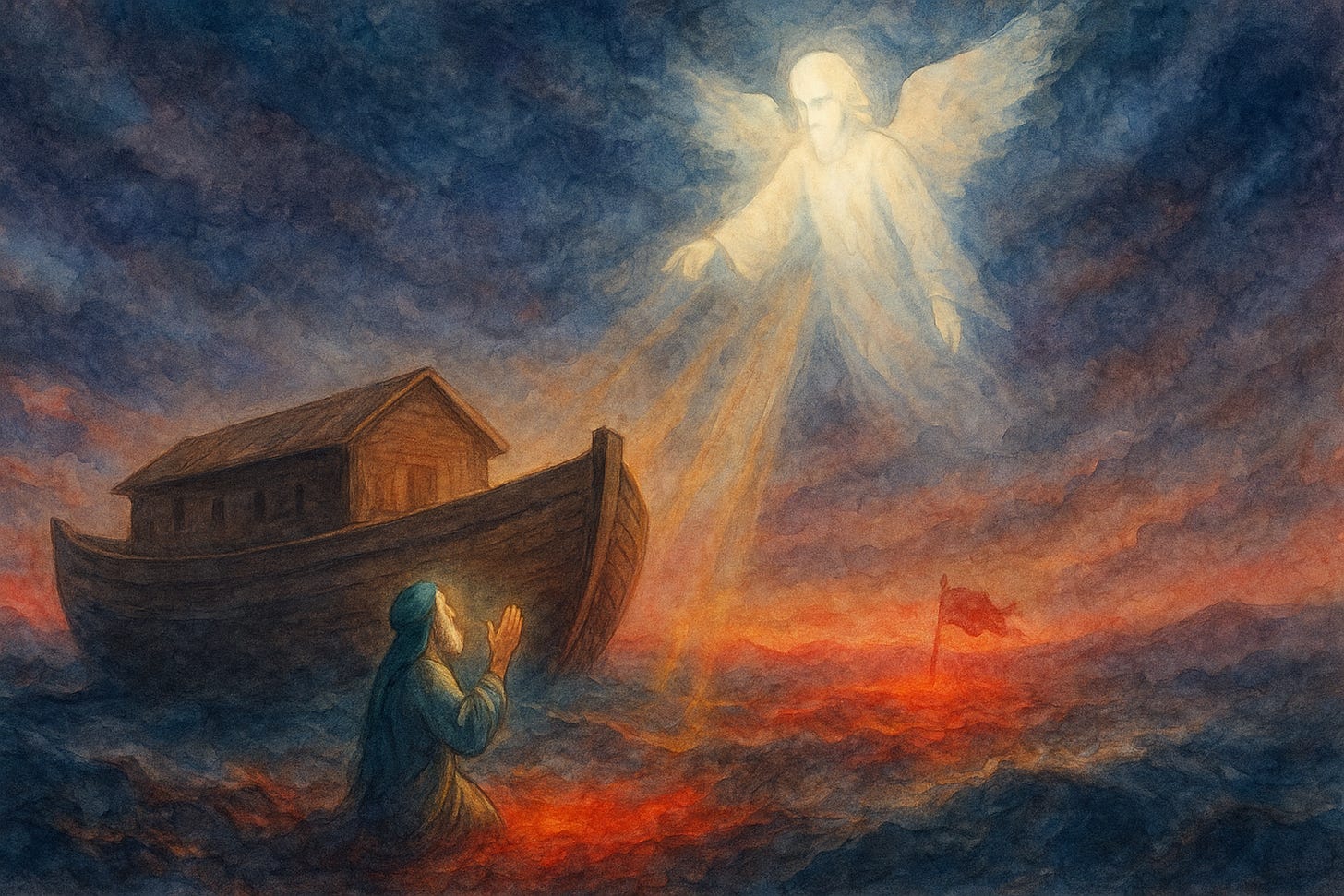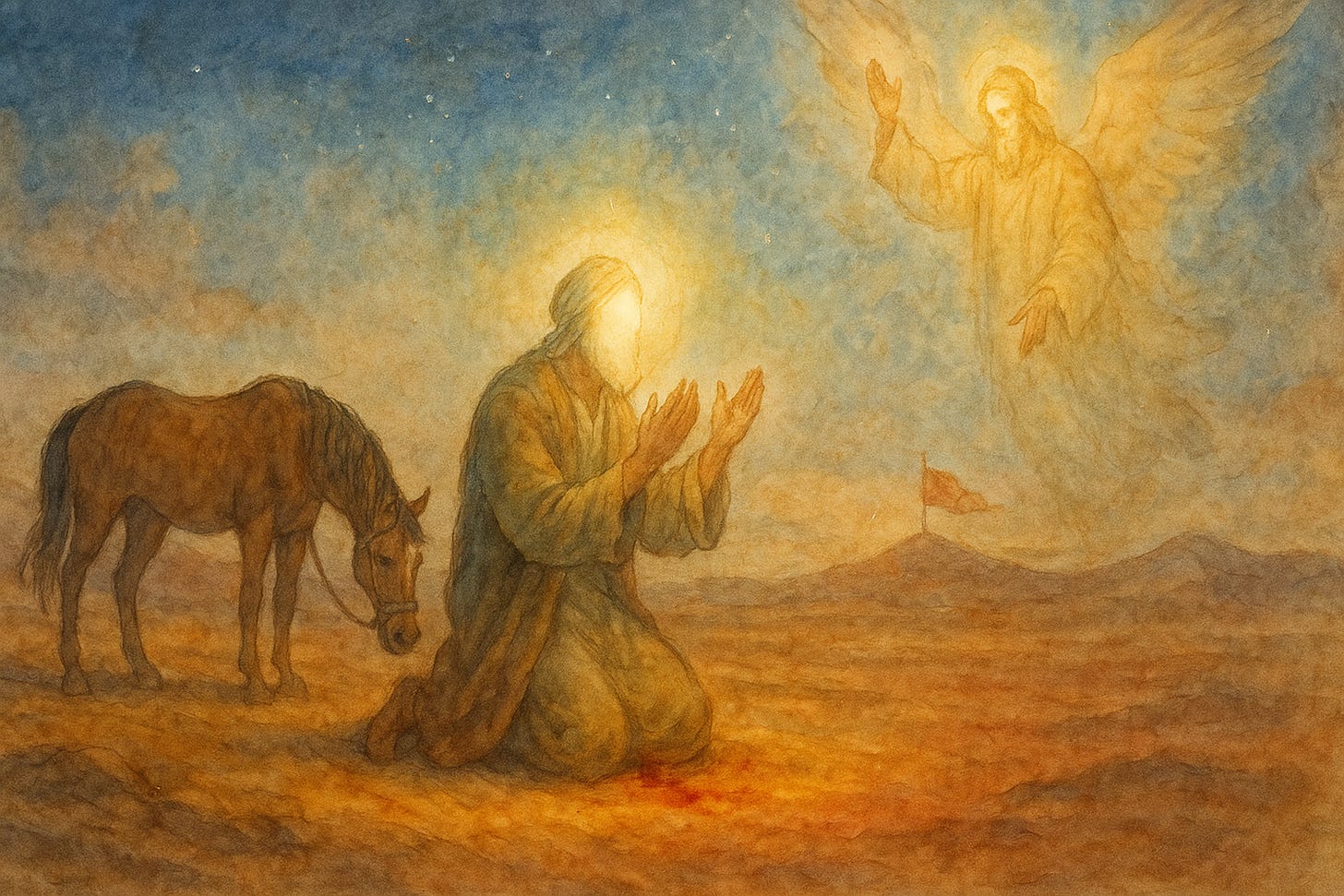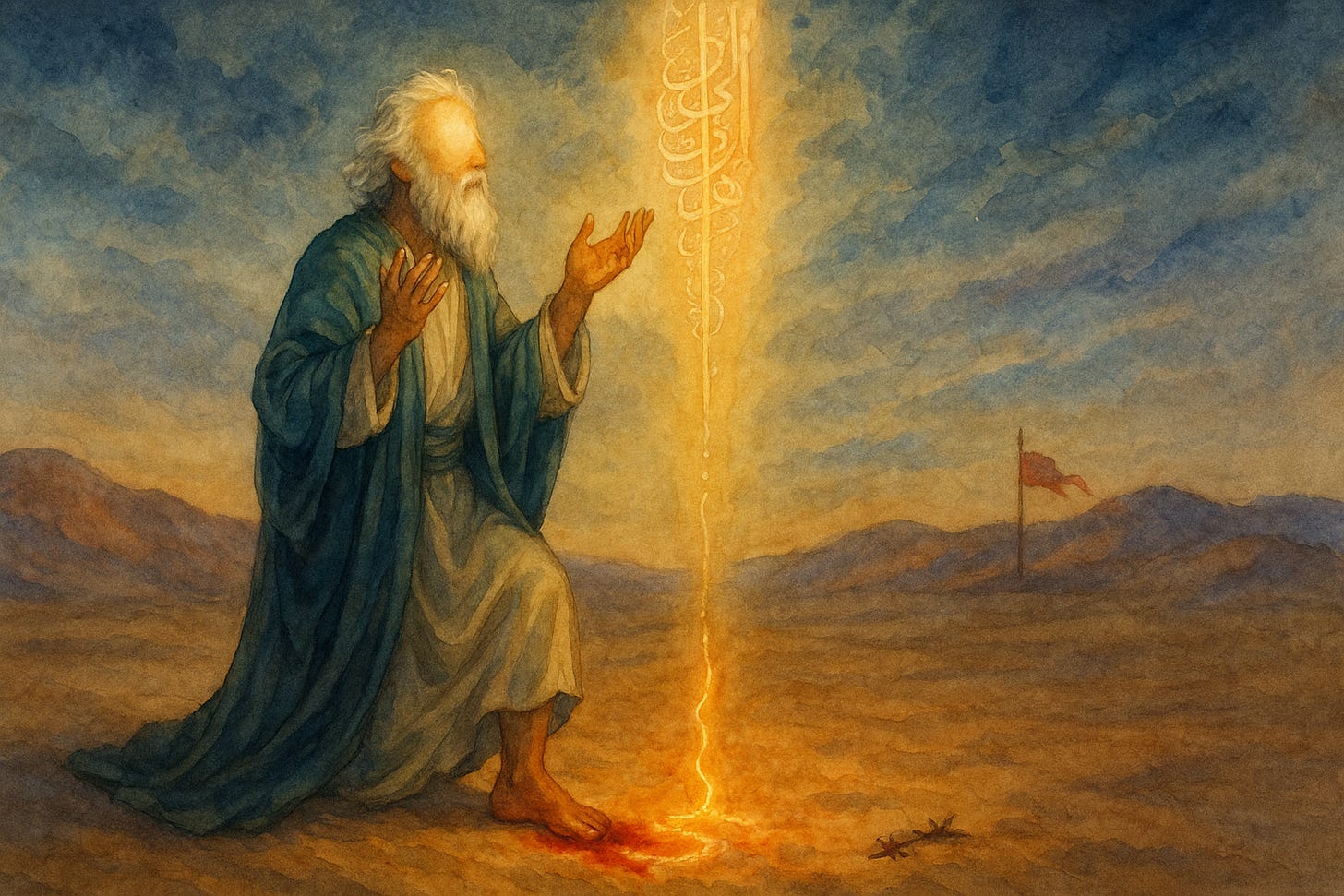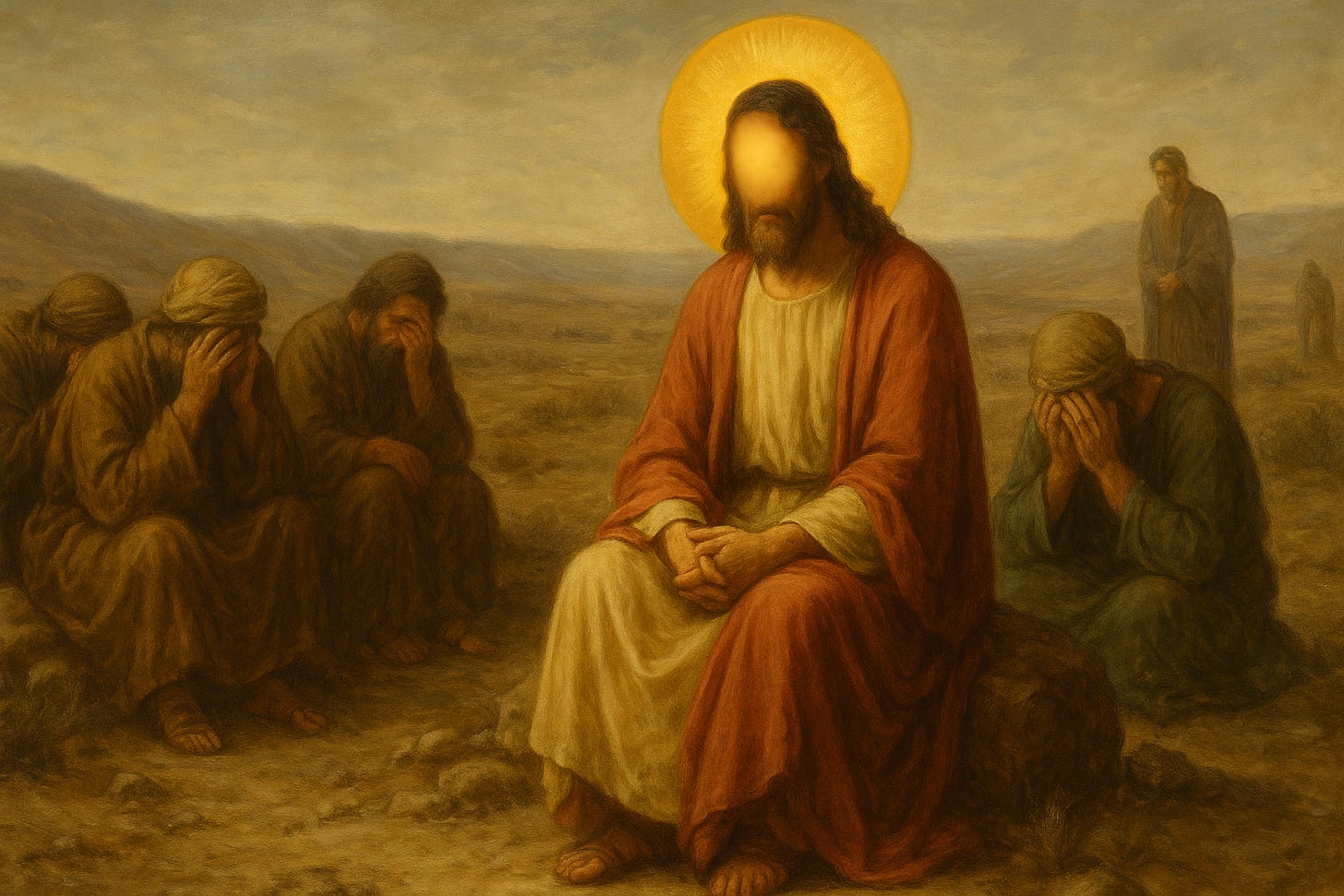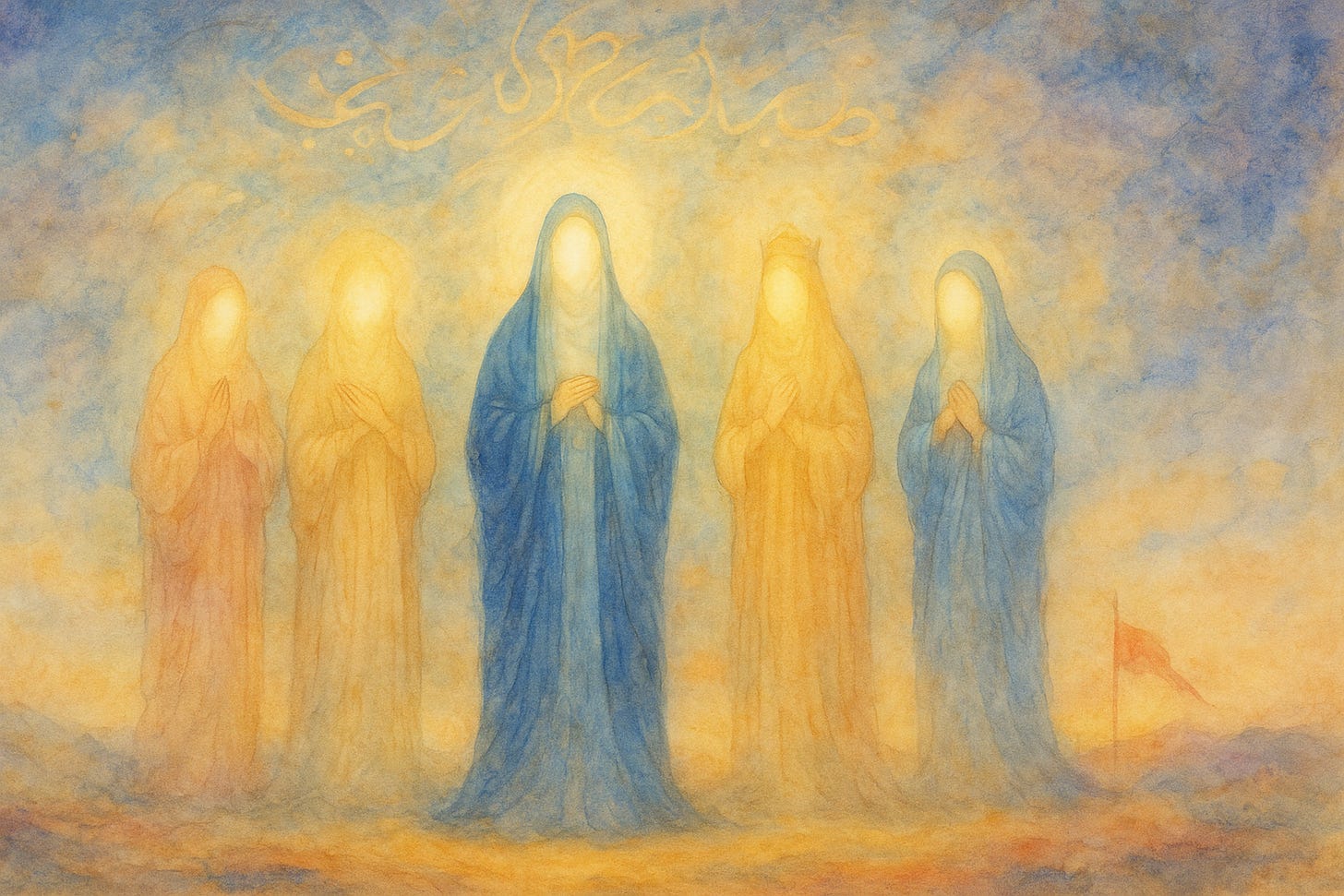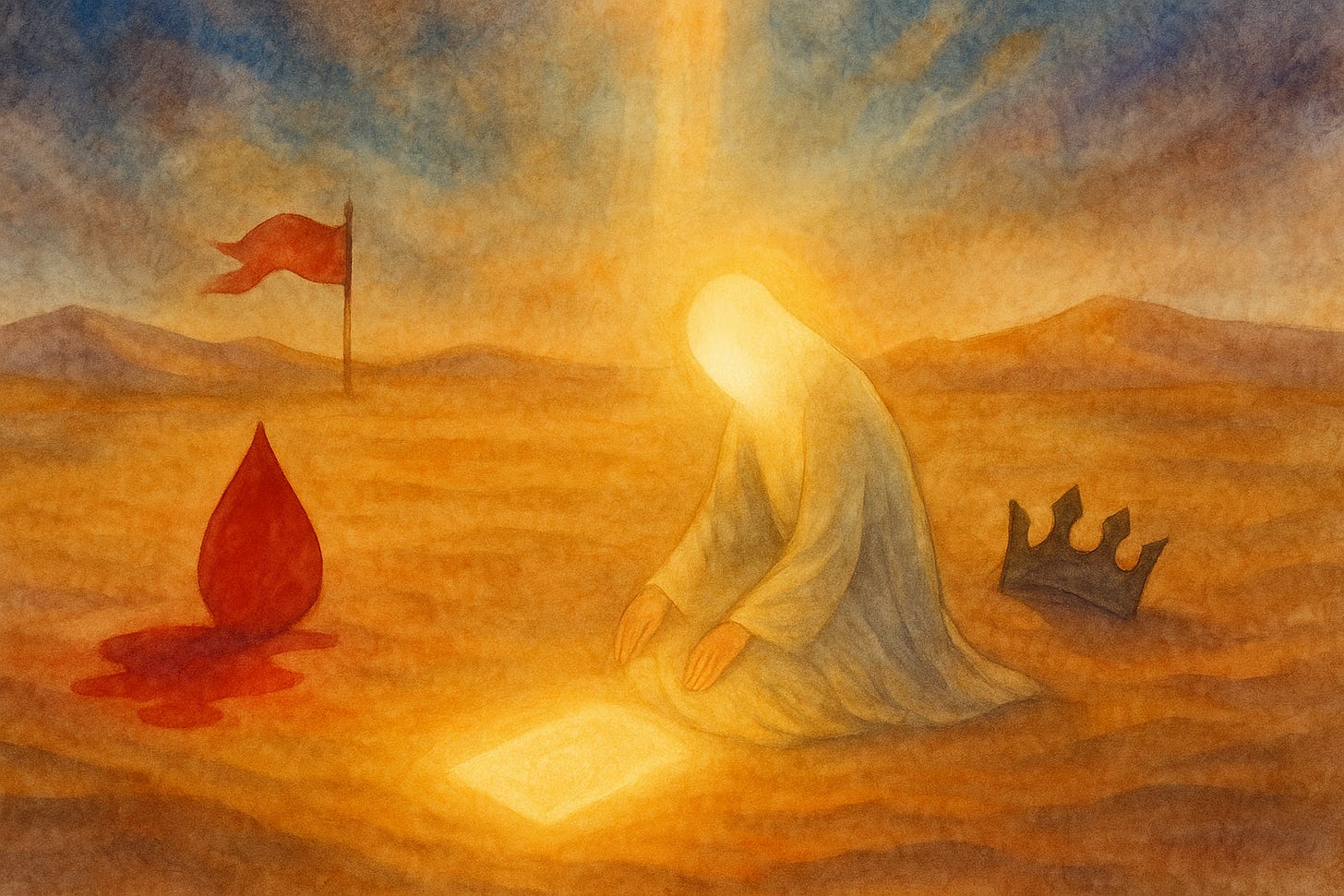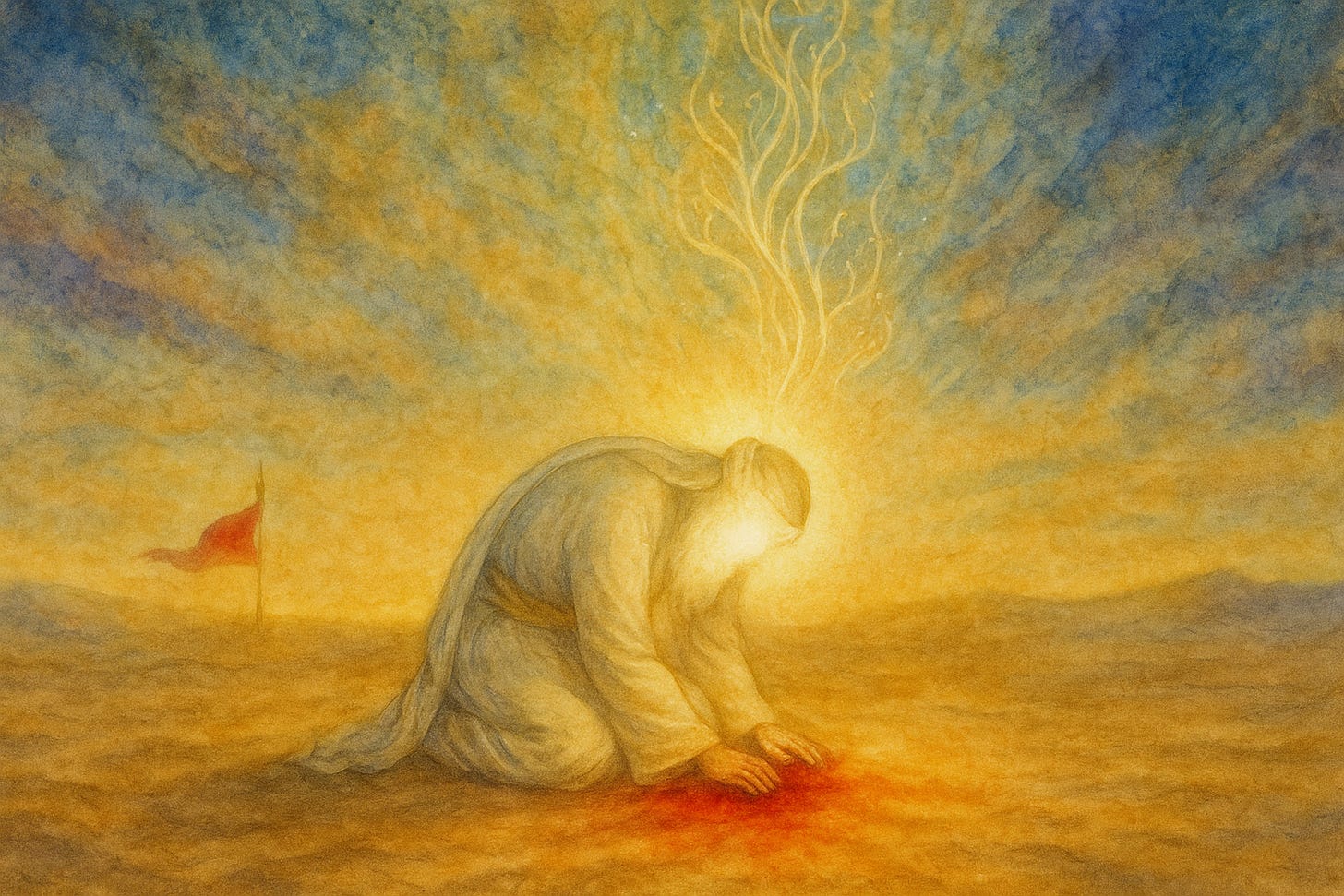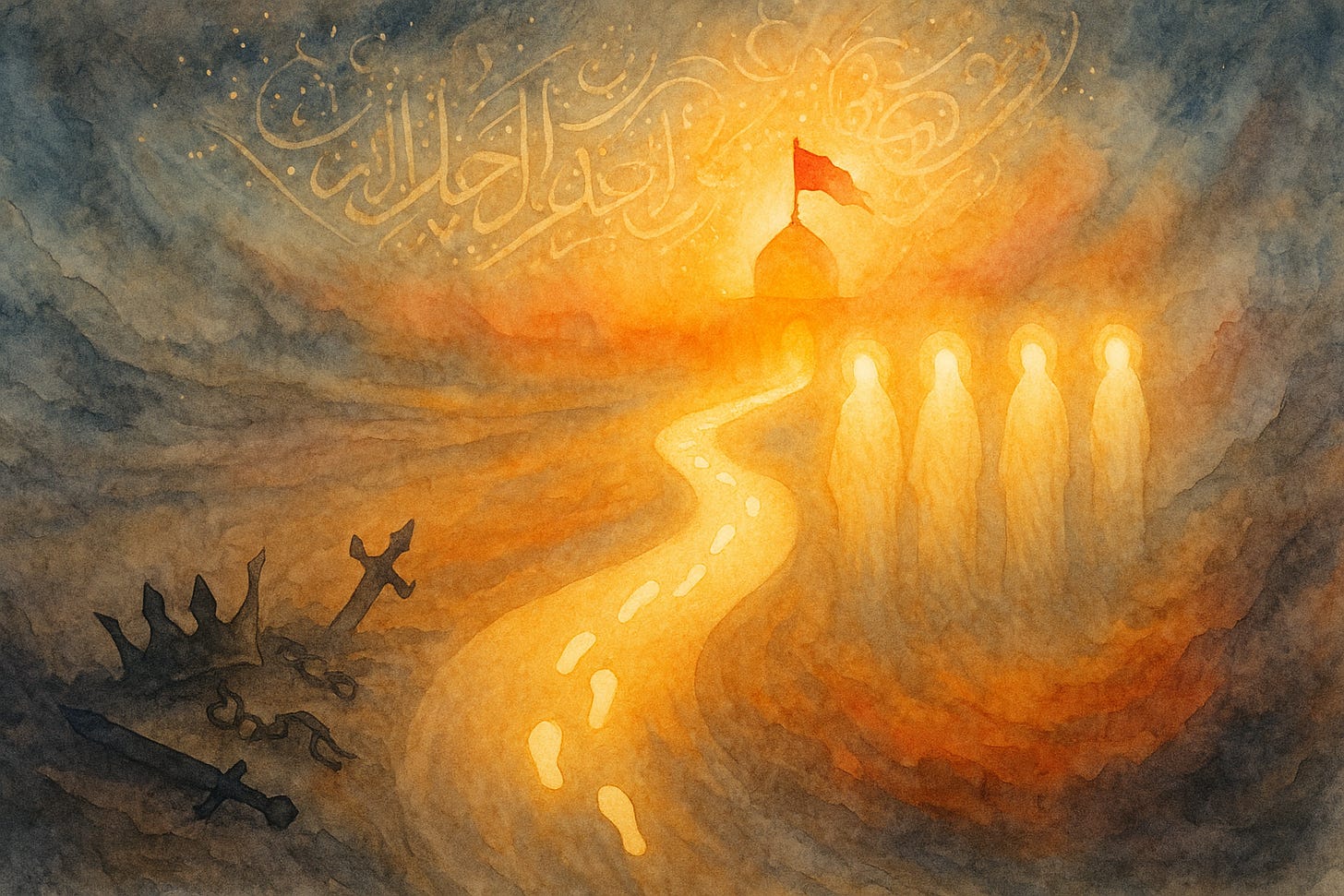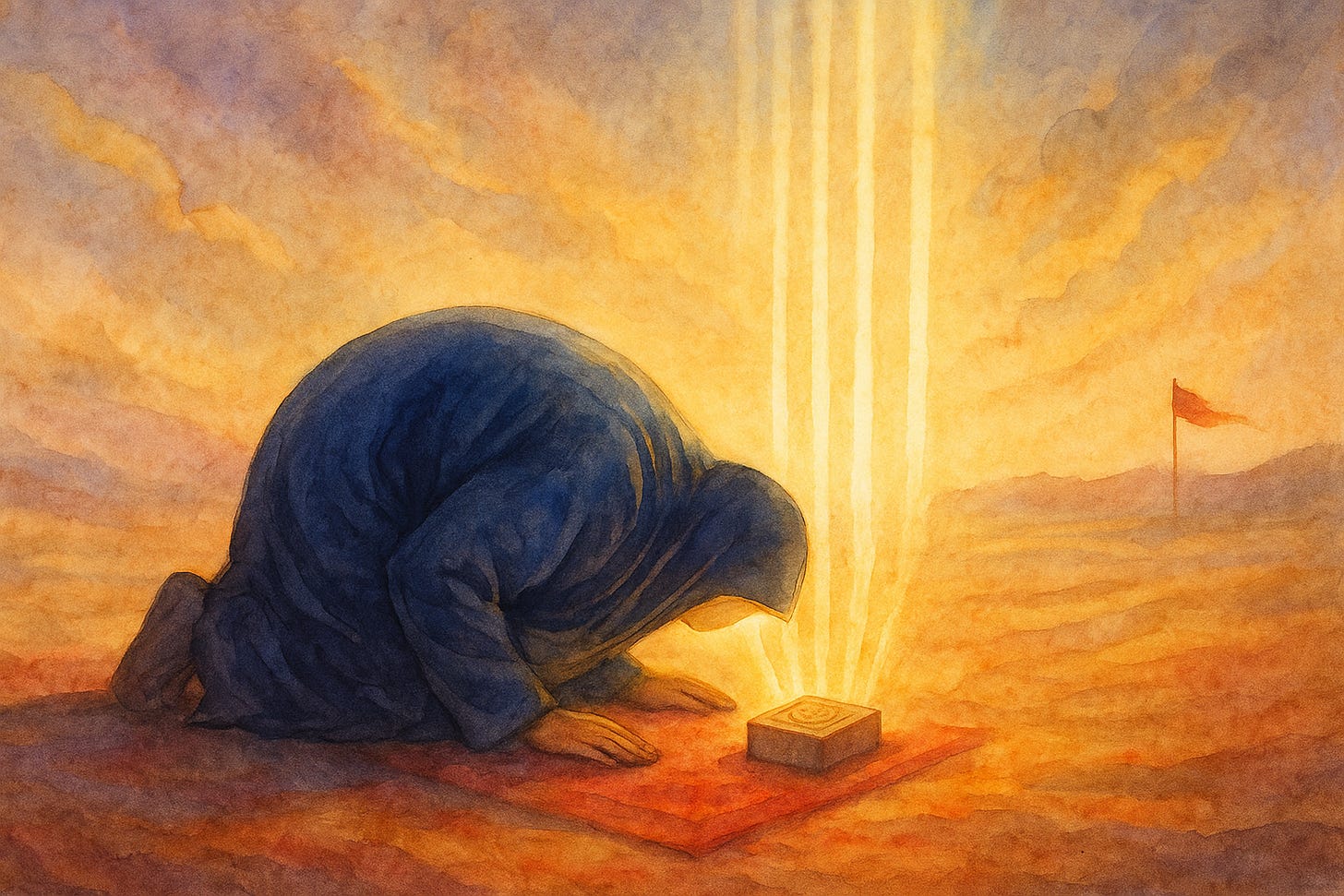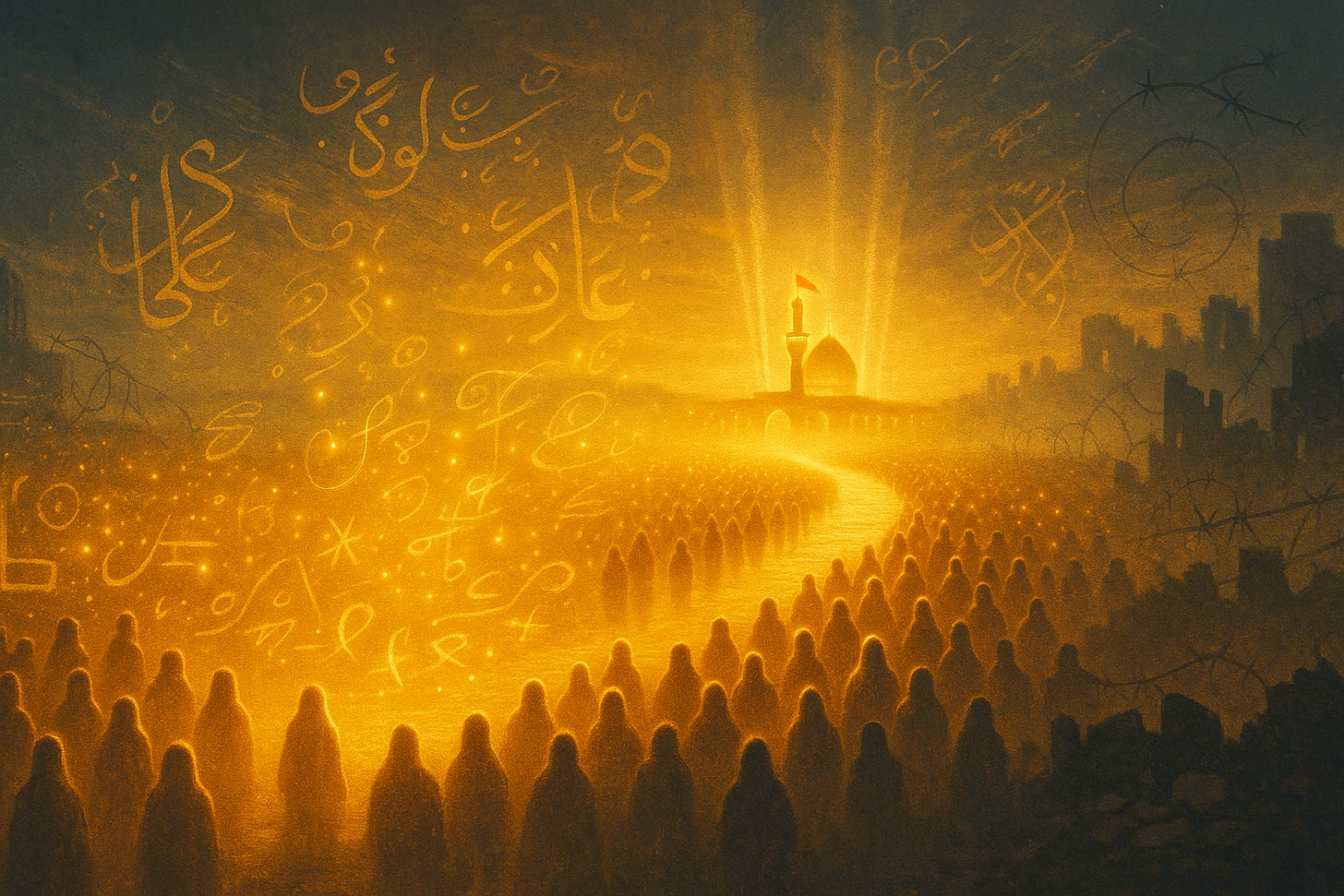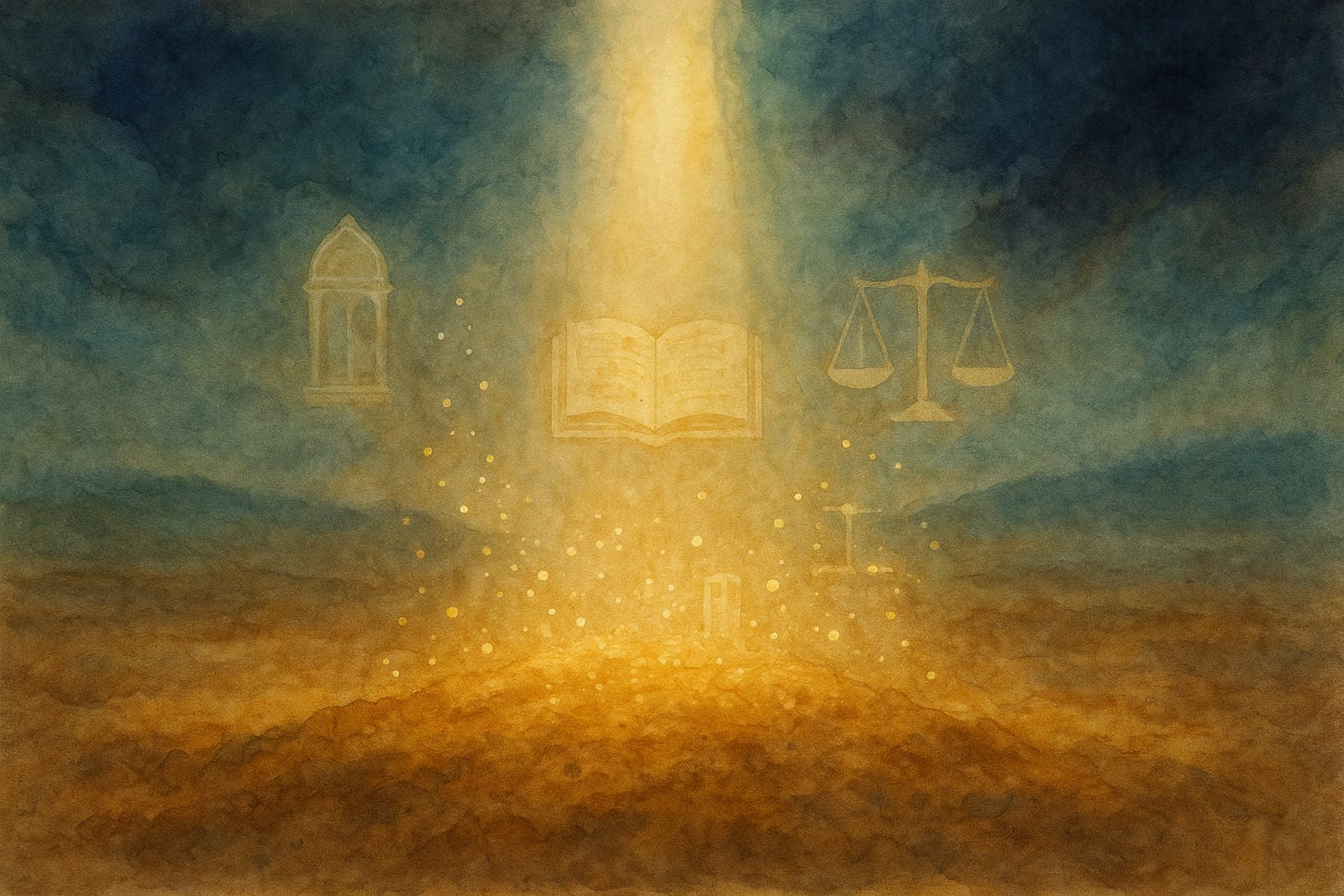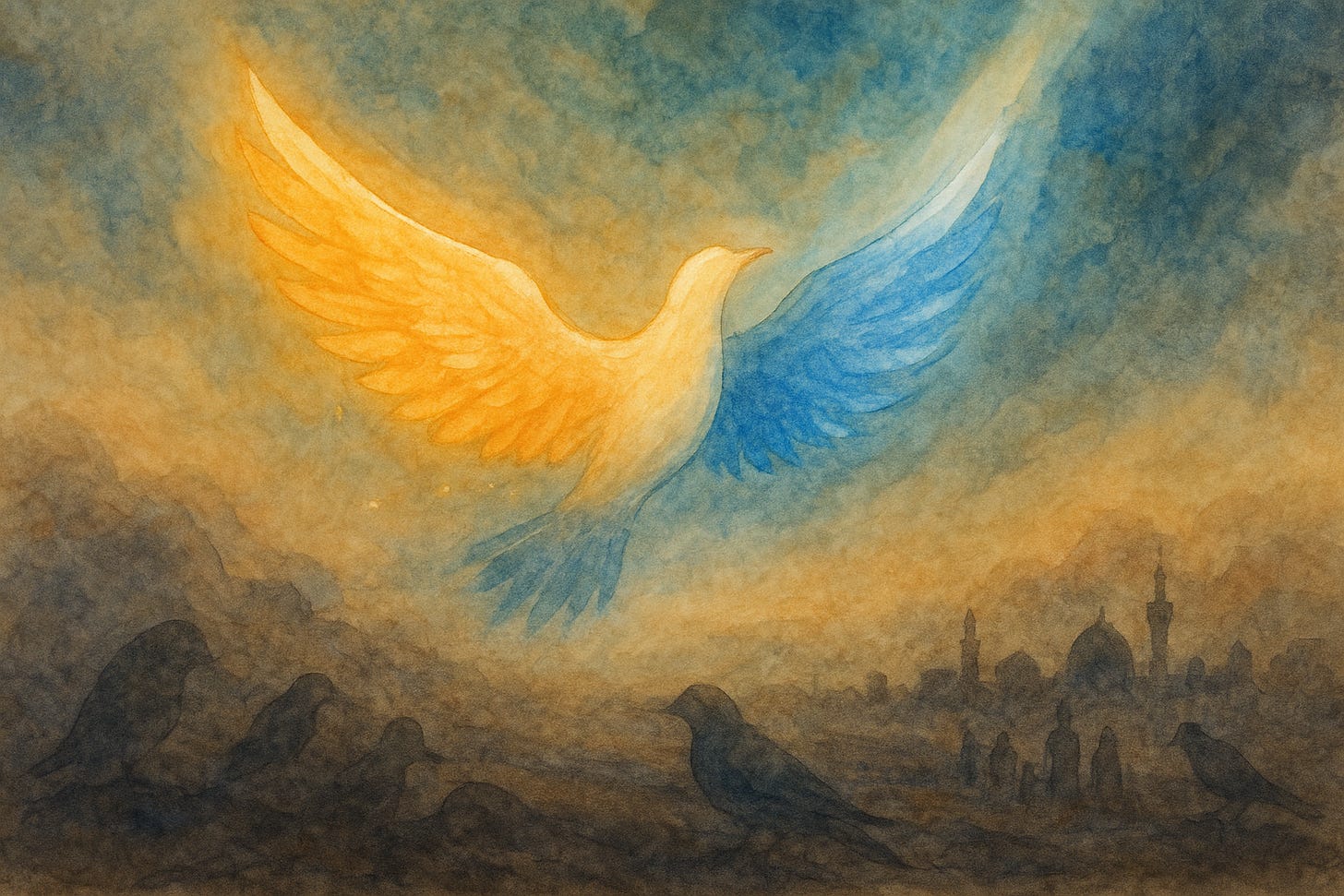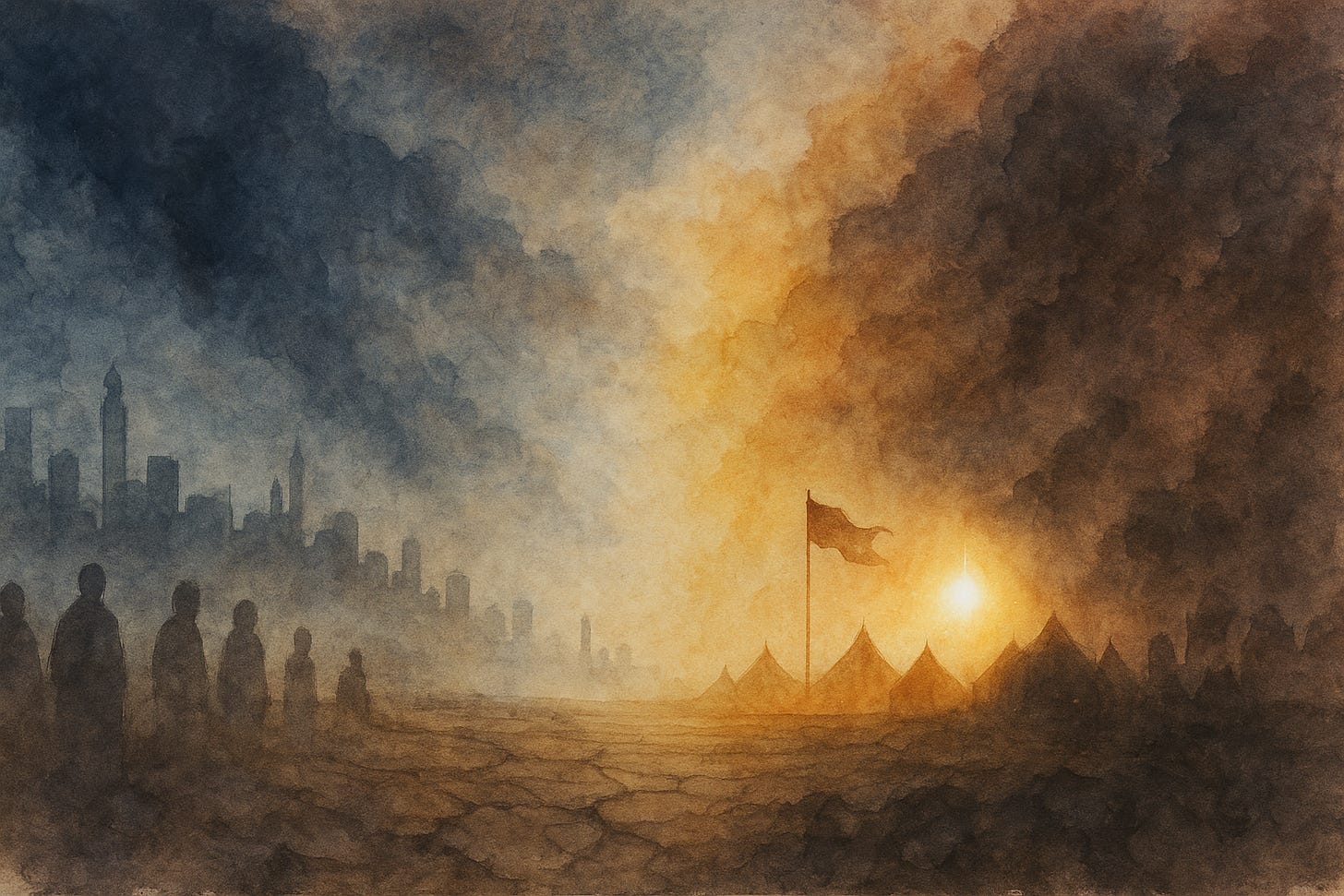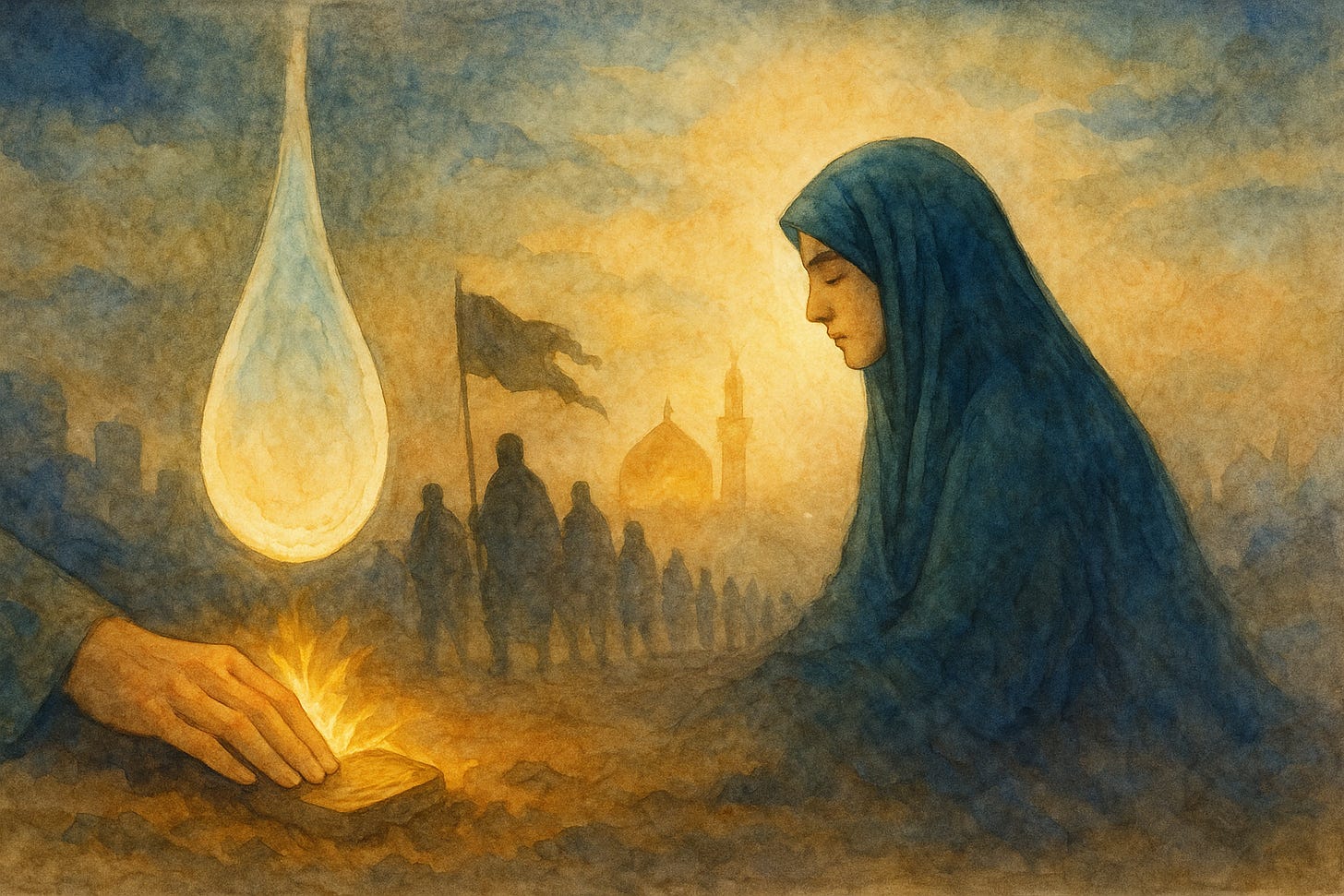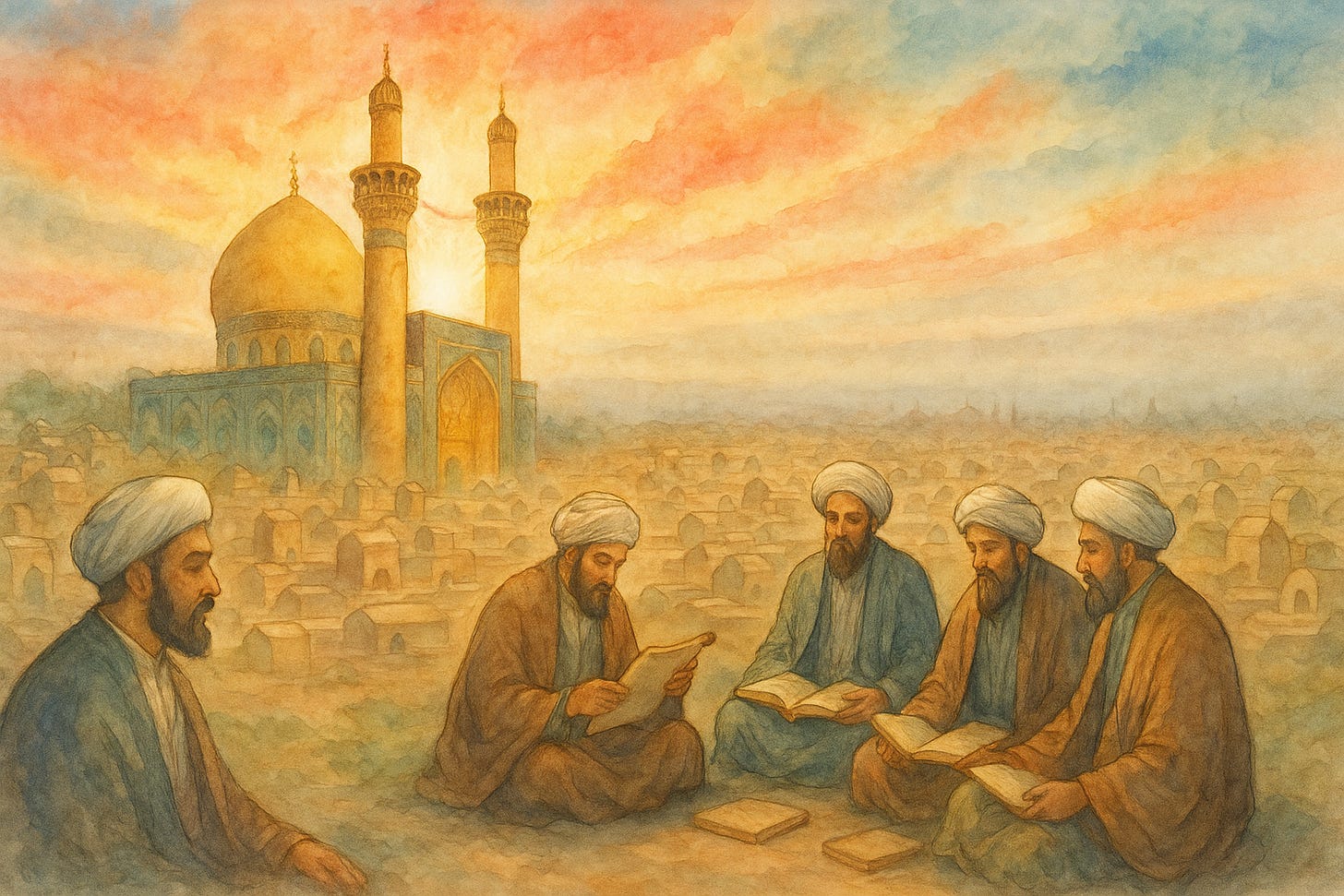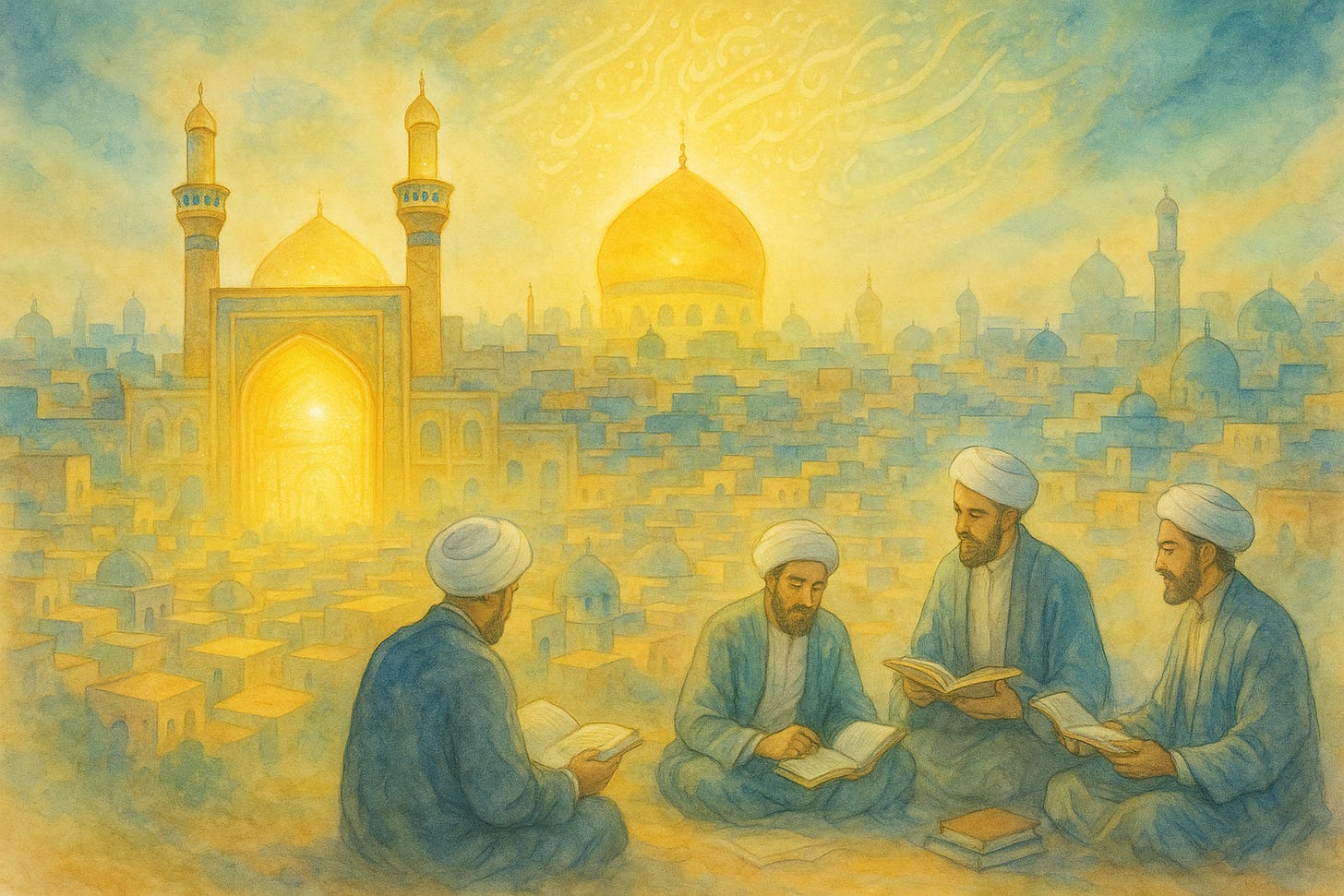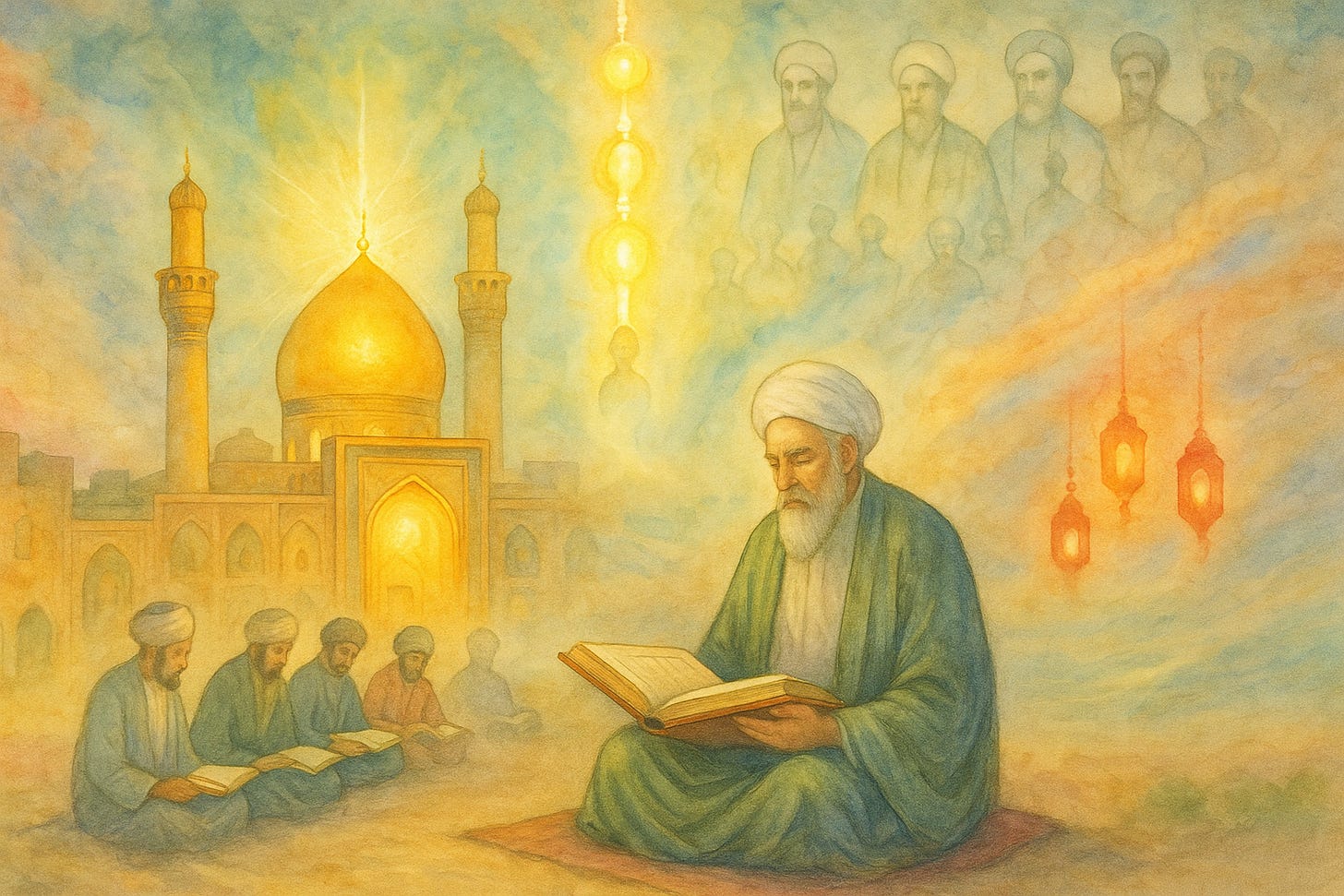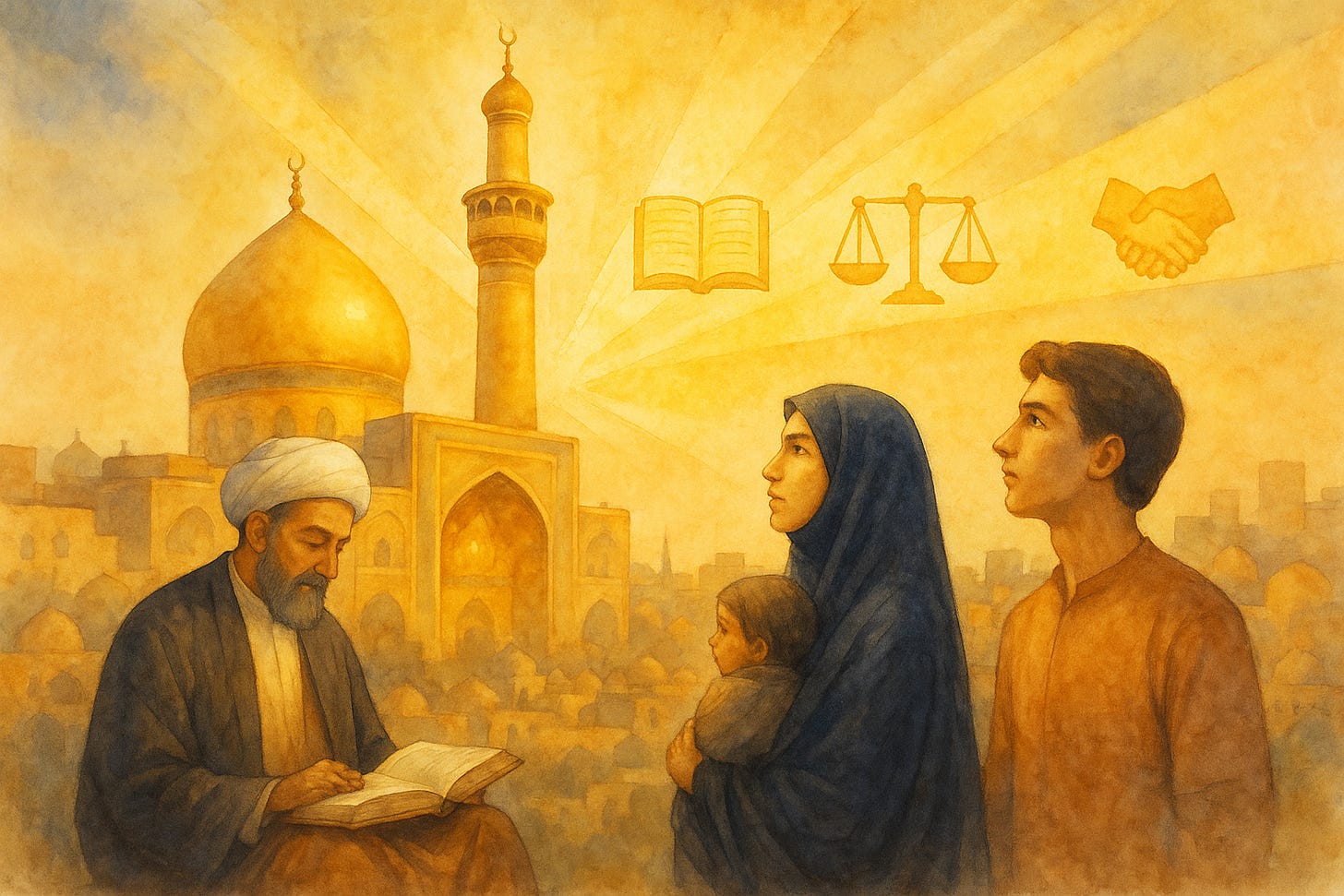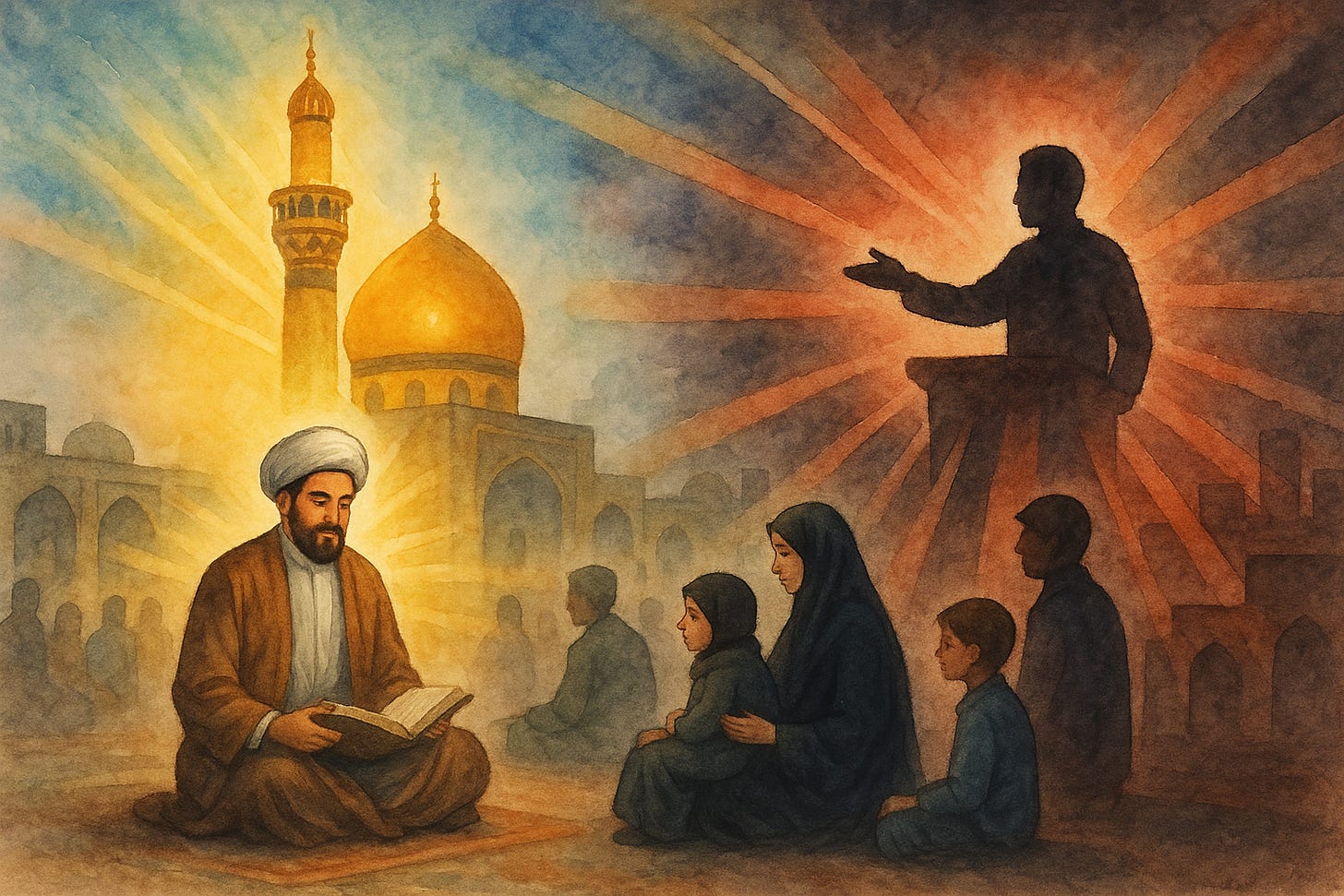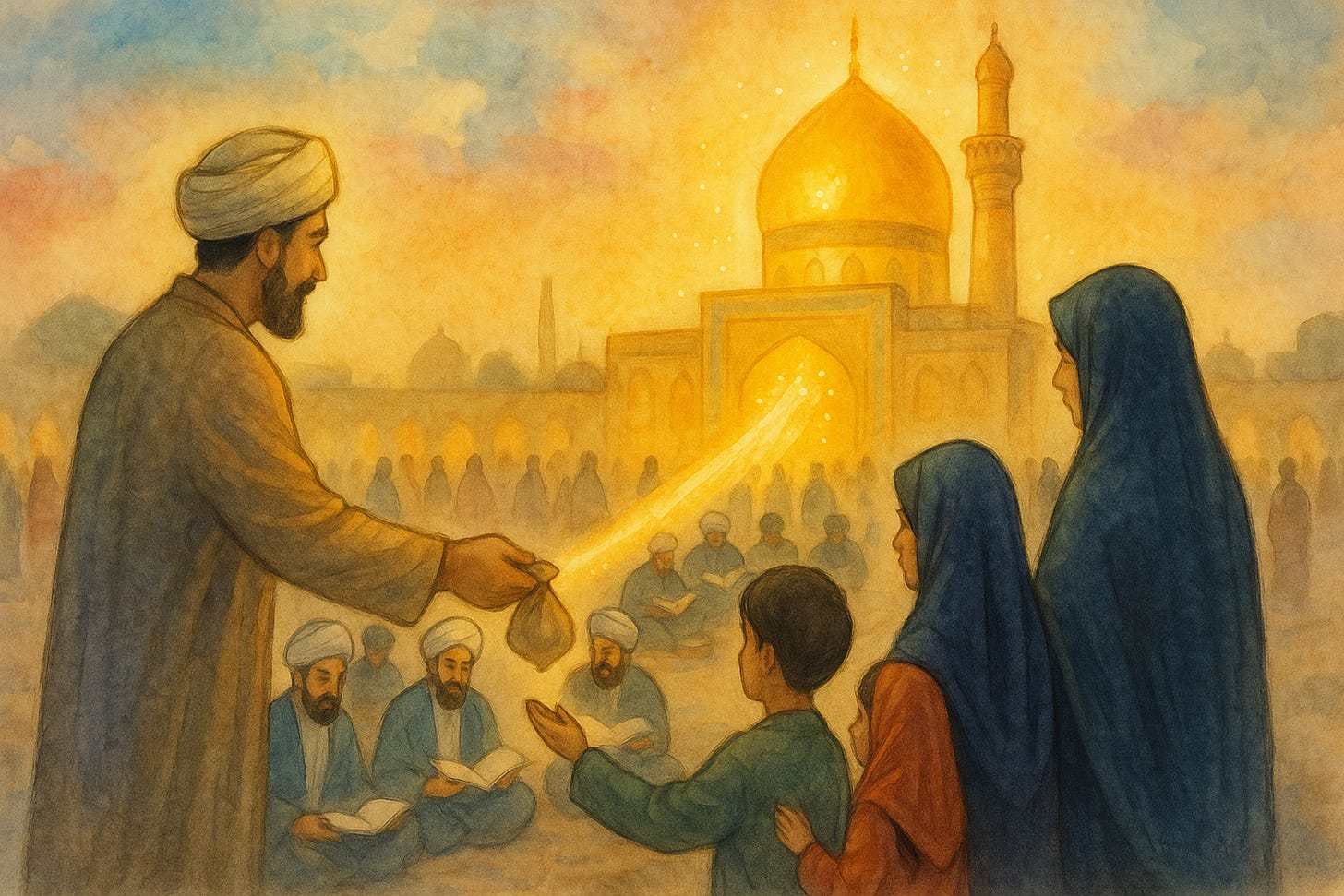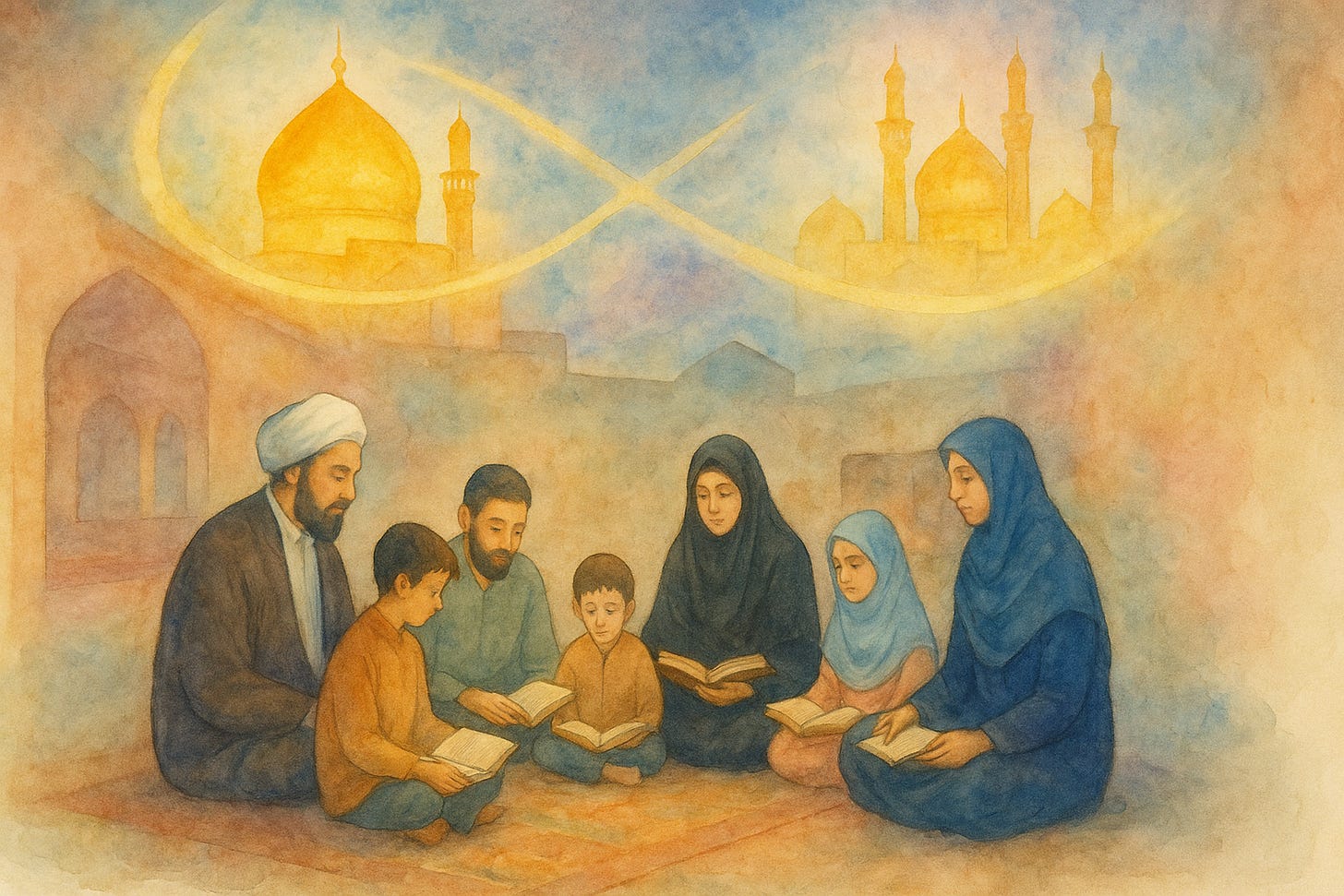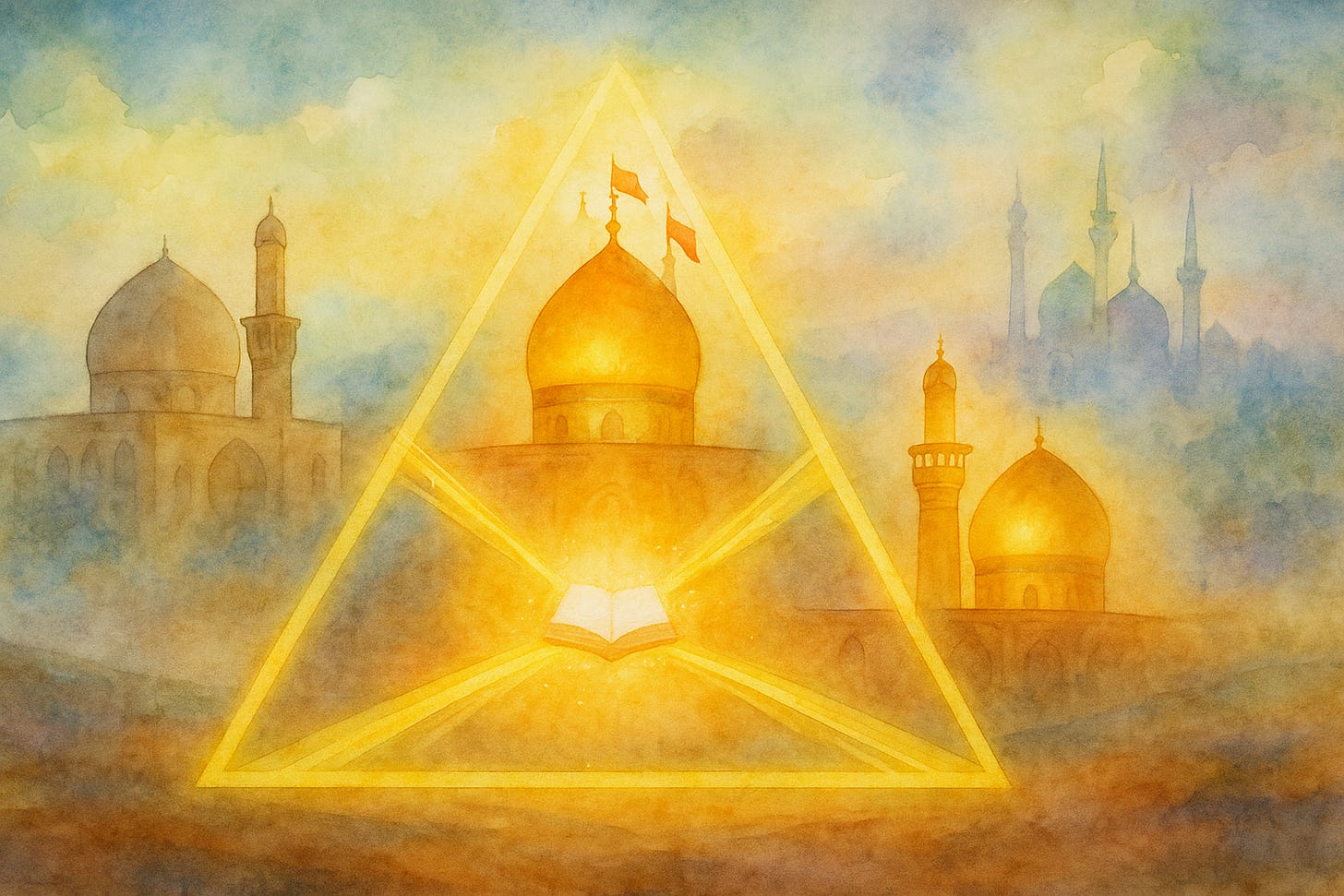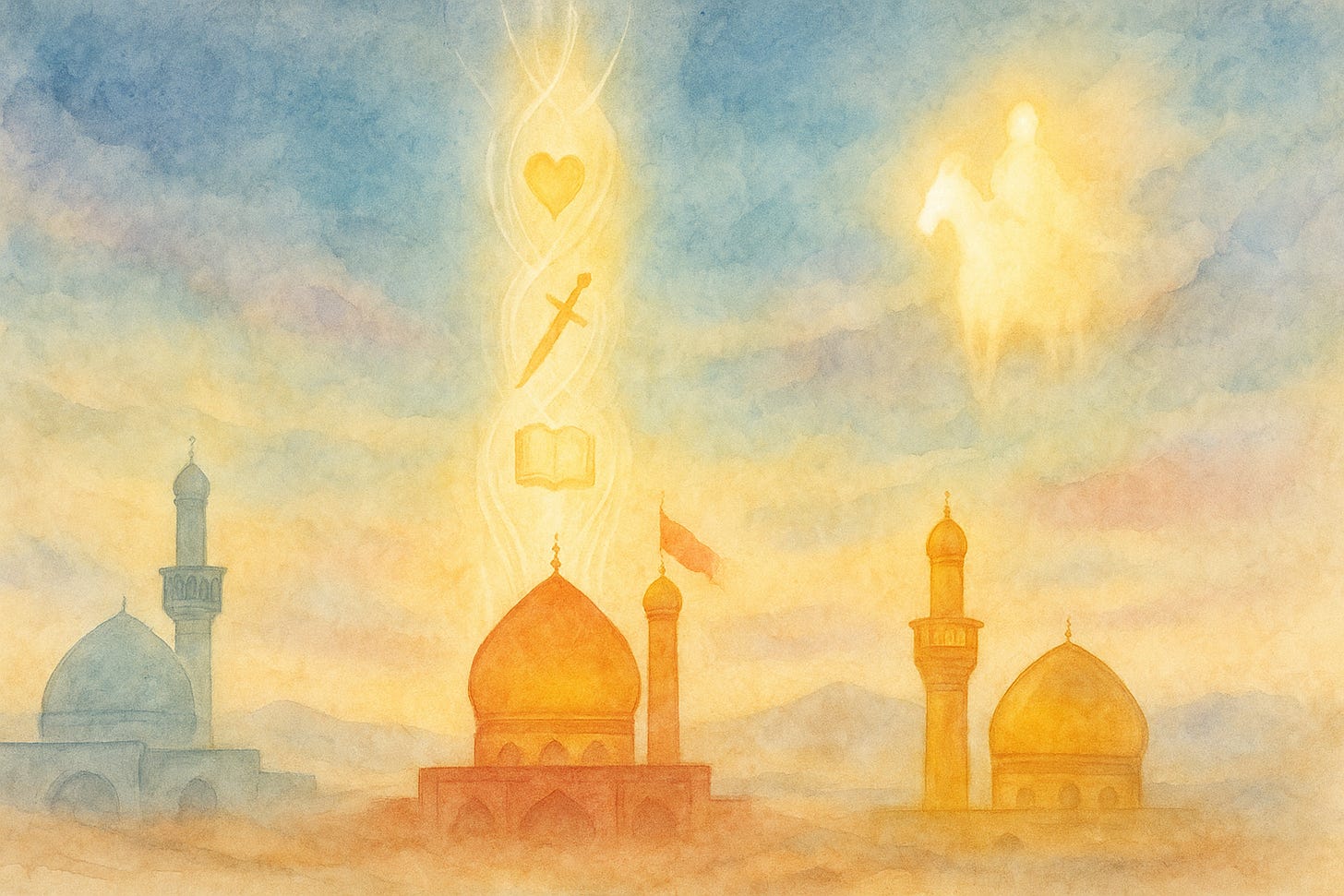[17] The Art of Supplication - The Sacred Windows: The Role of Place - Part 2 - The Crucible, The Criterion, and The Citadel
A series of discussions based on the book Uddat al-Dai wa Najah as-Saee - The Provision of the Supplicant, and the Triumph of the Seeker by Ibn Fahd al-Hilli on the subject of Supplication and Prayer.
In His Name, the Most High
This is the seventeenth part of our series, The Art of Supplication, an ongoing exploration into the sacred relationship between the supplicant, the supplication, and the Divine.
The insights within this series are cumulative, and the nature of our discussion requires that each part build upon foundations laid in the ones that came before.
To prevent any misunderstanding and to fully benefit from the depth of this subject, it is essential that you engage with the previous parts in order before continuing with this one.
The previous parts in this series can be found here:
Video of the Majlis (Sermon/Lecture)
This write up is a companion to the video majlis (sermon/lecture) found below:
Audio of the Majlis (Sermon/Lecture)
This write up is a companion to the audio majlis (sermon/lecture) found below:
Recap
The Sacred Windows: The Role of Place - Where Earth Meets Heaven
In our last majlis, we began a new journey in our exploration of “The Art of Supplication.” Having previously traced the sacred rhythms of Time, we turned our focus to the holy ground upon which the drama of faith unfolds, opening the first of our Sacred Windows: The Role of Place.
We established a foundational principle: sacred places are not locations where God is more present, for He transcends all space. Rather, they are points on the earth that have been touched by a divine act.
We anchored this understanding in the profound insight of Ayatullah Jawadi-Amoli, who teaches us that:
زمین وقتی محل تجلی فعل الهی شد، مَهبِط رحمت و مِحراب عبادت میگردد.
“When the earth becomes the place of Divine manifestation, it becomes the descent-point of mercy and the sanctuary of worship.”
— Ayatullah Jawadi-Amoli, Tafsir-e Tasnim, commentary on al-Qasas (28:30), Volume 16, Pages 82-84
Guided by this principle, our journey began by tracing the Qur’an’s own sacred geography, pausing at three luminous sanctuaries that form the heart of our faith:
We began at Makkah, the Primordial Sanctuary. We learned it is the axis from which creation spread, the eternal Qiblah that orients our bodies, and a physical mirror for the ultimate sanctuary—the believer’s purified heart, the very throne of the Most Merciful.
We then travelled to Madinah, the Luminous Sanctuary. Here, we saw how revelation was woven into the fabric of a living community. It is the city founded on taqwa (piety) and cemented by ithaar (altruism), providing the historical blueprint for a society where worship and justice are inseparable.
Finally, we stood at al-Quds, the Covenant of Justice. We understood it as the great bridge linking the message of Prophet Muhammad (peace be upon him and his family) to the legacy of all prophets before him. It is a land saturated with divine blessings, but also a living trial—a global symbol whose sanctity now stands as the ultimate measure of our sincerity and our commitment to the oppressed.
From the unity of Makkah, to the community of Madinah, to the justice of al-Quds, we learned that the earth is not a passive backdrop but a living witness. Tonight, we continue our journey along this sacred map, turning our attention to the lands consecrated by the trials, the leadership, and the martyrdom of the Imams of the Ahl al-Bayt...
In His Name, we continue …
The Role of Place - Part 2 - The Crucible, The Criterion, and The Citadel
Kufa — The City of Covenant and Clarification
Tonight, we continue our journey along the sacred map, moving from the foundational sanctuaries of revelation to a city that serves as both a beacon and a warning.
If Makkah is the axis of unity, Madinah the blueprint for community, and al-Quds the measure of justice, then Kufa is the crucible of loyalty.
It is a land consecrated by the presence of prophets and the leadership of the Commander of the Faithful, Imam Ali (peace be upon him), yet scarred by the memory of broken promises. Kufa is not just a location; it is a profound and recurring test of the human heart, forcing us to confront the dangerous chasm that lies between passive admiration and active allegiance.
The Capital of Divine Justice
When Imam Ali (peace be upon him) moved the seat of governance to Kufa, it was a profound theological statement. He was establishing the world’s first capital built not on tribal power or material wealth, but on the singular principle of Divine Justice.
It was here that the Qur’an’s call for justice was to be made manifest on earth. God commands in the Qur’an:
يَـٰٓأَيُّهَا ٱلَّذِينَ ءَامَنُوا۟ كُونُوا۟ قَوَّٰمِينَ لِلَّهِ شُهَدَآءَ بِٱلْقِسْطِ ۖ وَلَا يَجْرِمَنَّكُمْ شَنَـَٔانُ قَوْمٍ عَلَىٰٓ أَلَّا تَعْدِلُوا۟ ۚ ٱعْدِلُوا۟ هُوَ أَقْرَبُ لِلتَّقْوَىٰ
“O you who have believed, be persistently standing firm for God, witnesses in justice, and do not let the hatred of a people prevent you from being just. Be just; that is nearer to righteousness.”
— Qur’an, Surah al-Ma’idah (the Chapter of the Table Spread) #5, Verse 8
Imam Ali’s government in Kufa was the embodiment of this verse.
From its pulpit, he delivered the masterful sermons of Nahjul Balagha, including his timeless instructions to his governor in Egypt, Malik al-Ashtar, which remains the ultimate charter on just governance in Islam.
He reminded him — and indeed each of us:
وَأَشْعِرْ قَلْبَكَ الرَّحْمَةَ لِلرَّعِيَّةِ، وَالْمَحَبَّةَ لَهُمْ، وَاللُّطْفَ بِهِمْ... فَإِنَّهُمْ صِنْفَانِ: إِمَّا أَخٌ لَكَ فِي الدِّينِ، وَإمَّا نَظِيرٌ لَكَ فِي الْخَلْقِ
“Infuse your heart with mercy, love, and kindness for your subjects... for they are of two kinds: either your brother in faith or your equal in creation.”
— Al-Sharif al-Radhi, Nahj al-Balagha, Volume 3, Letter #53 (to Malik al-Ashtar)
The ground itself was already sacred, a place saturated with prophecy.
The sanctity of its Great Mosque is unmatched outside the Haramayn (the two holy places of Makkah and Madinah).
Imam Ja’far al-Sadiq (peace be upon him) described it as a place chosen by God since the beginning of creation, stating:
مَكَّةُ حَرَمُ اللَّهِ وَ الْمَدِينَةُ حَرَمُ رَسُولِ اللَّهِ (ص) وَ الْكُوفَةُ حَرَمُ أَمِيرِ الْمُؤْمِنِينَ (ع) جَعَلَهَا حَرَماً لَهُ وَ لِوُلْدِهِ مِنْ بَعْدِهِ
“Makkah is the sanctuary of God, Madinah is the sanctuary of the Messenger of God (peace be upon him and his family), and Kufa is the sanctuary of the Commander of the Faithful (peace be upon him). He made it a sanctuary for himself and for his children after him.”
— Shaykh al-Tusi, Tahdhib al-Ahkam, Volume 6, Kitab al-Mazar (The Book of Pilgrimage), Chapter on the Virtue of Kufa and its Mosque, Page 31, Hadeeth 60
This was the immense spiritual capital upon which Imam Ali built his state—a land of prophets, a sanctuary of the Imam, and the designated stage for the establishment of divine justice on earth.
The Pathology of Hesitation
Yet, this city of promise became the theatre of a profound spiritual disease: the pathology of hesitation.
The crisis of Kufa was the failure to translate love into loyalty, admiration into action.
The Qur’an precisely diagnoses this condition when describing those whose faith is fragile, who make excuses when called to struggle.
During the Battle of the Trench, it describes those who said:
إِنَّ بُيُوتَنَا عَوْرَةٌ وَمَا هِىَ بِعَوْرَةٍ ۖ إِن يُرِيدُونَ إِلَّا فِرَارًا
“Indeed, our houses are exposed,” while they were not exposed. They did not intend except to flee.
— Qur’an, Surah al-Ahzab (the Chapter of the Confederates) #33, Verse 13
This “culture of the excuse” became the defining tragedy of Kufa.
The people admired Imam Ali, yet their support wavered at critical moments, prompting his famous, heart-breaking sermons where he cried out against their inaction and disobedience:
أَمَّا بَعْدُ، فَإِنَّ الْجِهَادَ بَابٌ مِنْ أَبْوَابِ الْجَنَّةِ... فَمَنْ تَرَكَهُ رَغْبَةً عَنْهُ أَلْبَسَهُ اللهُ ثَوْبَ الذُّلِّ... وَقَدْ دَعَوْتُكُمْ إِلَى حَرْبِ هؤُلاَءِ الْقَوْمِ لَيْلاً وَنَهَاراً، وَسِرّاً وَإِعْلاَناً... فَإِذَا أَمَرْتُكُمْ بِالسَّيْرِ إِلَيْهِمْ فِي أَيَّامِ الْحَرِّ قُلْتُمْ: هذِهِ حَمَارَّةُ الْقَيْظِ... وَإِذَا أَمَرْتُكُمْ بِالسَّيْرِ إِلَيْهِمْ فِي الشِّتَاءِ قُلْتُمْ: هذِهِ صَبَارَّةُ الْقُرِّ!
“Now then, surely Jihad is one of the doors of Paradise... Whoever abandons it, being averse to it, God clothes him in the garment of disgrace... I called you to fight these people night and day, secretly and openly... but when I ordered you to march towards them in the hot season, you said, ‘This is the height of summer’s heat...’ And when I ordered you to march towards them in the winter, you said, ‘This is the time of severe cold!’”
— Al-Sharif al-Radhi, Nahj al-Balagha, Volume 1, Sermon #27
This generational curse of hesitation reached its terrible climax with the betrayal of Imam Husayn.
The Ziyarah for his envoy, Muslim ibn Aqil, confronts this failure directly, where the visitor testifies:
لَعَنَ اللهُ مَنْ قَتَلَكَ وَلَعَنَ اللهُ مَنْ أَمَرَ بِقَتْلِكَ وَلَعَنَ اللهُ مَنْ ظَلَمَكَ وَلَعَنَ اللهُ مَنْ خَذَلَكَ
“May God’s mercy be distant from those who killed you, and may those who ordered your killing be excluded from God’s mercy, and may God exclude from His mercy those who oppressed you, and may God remove from His mercy those who abandoned you.”
— Shaykh Abbas al-Qummi, Mafatih al-Jinan, Ziyarah of Muslim ibn Aqil
The sin of abandonment is placed on par with the sin of murder.
As the great contemporary scholar and thinker, Ayatullah Jawadi-Amoli, explains, this is because such abandonment is the pre-condition for the oppressor’s success:
خذلان و تنها گذاشتن حق، باطل را جريء میکند. جامعهای که در حمايت از ولیّ شرعی خود سکوت کند، خود راه را برای جولان دادن طاغوت هموار میسازد.
“Indeed, the abandonment of truth is what emboldens falsehood. A society that remains silent and fails to support its legitimate guardian (wali) is the very thing that paves the way for the tyrant to run rampant.”
— Ayatullah Jawadi-Amoli, from his commentary series on Nahj al-Balagha, Adab-e Fana-ye Moqarraban, Volume 7, Page 115
A Prophetic Counter-Narrative: The Repentance of Nineveh
The tragic choice of the Kufans was not made in a historical vacuum. The spiritual history of Mesopotamia itself holds the story of another great city that faced a similar call to guidance but made the opposite choice: the city of Nineveh. Its story serves as a powerful scriptural precedent that highlights the magnitude of Kufa’s failure.
The Hebrew Bible, in the Book of the Prophet Jonah, recounts how the sinful people of Nineveh heeded the prophet’s warning, and their entire city—from the king to the common folk—repented with fasting and prayer.
As a result, God spared them from the destruction they faced:
וַיַּרְא הָאֱלֹהִים אֶת־מַעֲשֵׂיהֶם כִּי־שָׁבוּ מִדַּרְכָּם הָרָעָה וַיִּנָּחֶם הָאֱלֹהִים עַל־הָרָעָה אֲשֶׁר־דִּבֶּר לַעֲשׂוֹת־לָהֶם וְלֹא עָשָֽׂה׃
“When God saw what they did and how they turned from their evil way, He relented and did not bring on them the destruction He had threatened.”
— Hebrew Bible, The Book of Jonah, Chapter 3, Verse 10
The story of Nineveh’s repentance highlights the magnitude of Kufa’s failure.
The ancient, non-believing people of Nineveh listened to the prophet Jonah and were saved.
The people of Kufa, who claimed to be believers, were called by the grandson of the Prophet Muhammad himself—someone far greater than Jonah—yet they abandoned him, sealing their spiritual doom.
This significance is so great that Prophet Jesus himself refers to it in the New Testament. When confronting the stubbornness of the people of his own time, he holds up the people of Nineveh as a model of repentance who will stand in judgment against them:
ἄνδρες Νινευῖται ἀναστήσονται ἐν τῇ κρίσει μετὰ τῆς γενεᾶς ταύτης καὶ κατακρινοῦσιν αὐτήν· ὅτι μετενόησαν εἰς τὸ κήρυγμα Ἰωνᾶ, καὶ ἰδοὺ πλεῖον Ἰωνᾶ ὧδε.
“The men of Nineveh will stand up at the judgment with this generation and condemn it; for they repented at the preaching of Jonah, and now something greater than Jonah is here.”
— New Testament, The Gospel of Matthew, Chapter 12, Verse 41
This prophetic echo, from both the Hebrew Bible and the words of Jesus, serves as a timeless lesson on the gravity of the choice that was placed before the people of Kufa, and the eternal consequences of their failure to repent and act.
The Kufa of Today: A Test of Tabyeen
This history is not a relic; it is a living diagnosis.
Kufa is not merely a city in Iraq; Kufa is a recurring choice.
The challenge of Kufa is the choice between comfortable silence and costly clarification (tabyeen). This is the spirit of Imam al-Sajjad (peace be upon him) in his whispered prayer, where he begs God for the strength to fulfil this duty of clear-sighted action:
وَٱسْتَفْرِغْ أَيَّامِي فِيمَا خَلَقْتَنِي لَهُ... وَٱجْعَلْ لِي يَدًا عَلَىٰ مَنْ ظَلَمَنِي، وَلِسَانًا عَلَىٰ مَنْ عَانَدَنِي
“And free my days for that for which You have created me... and give me a hand against him who wrongs me and a tongue against him who stubbornly disputes with me.”
— Imam Ali ibn al-Husayn Zayn al-Abedin, Al-Sahifa al-Sajjadiyyah, Dua #20 (On Noble Morals)
Today, our Kufa is the digital world of passive “likes” and empty slogans.
The test is to move from social-media assent to embodied service.
This requires a clear stance, a “tongue” against the stubborn deniers of truth.
The martyr, Shaykh Ragheb Harb, whose blood sanctified the resistance in South Lebanon, famously declared this principle:
الموقف سلاح، والمصافحة اعتراف
“The stance is a weapon, and the handshake is a recognition [of the enemy’s legitimacy].”
— Shaykh Ragheb Harb, Public Declaration and Defining Slogan, in his capacity as the Friday Prayer Imam, Jibsheet, South Lebanon, circa 1983
This is the duty to actively renew our covenant with the Imam of our Time each day, as we are taught in Du’a al-Ahd:
اَللّهُمَّ إِنِّي أُجَدِّدُ لَهُ فِي صَبيحةِ يَوْمي هذا وَما عِشْتُ مِنْ أَيَّامي عَهْداً وَعَقْداً وَبَيْعَةً لَهُ في عُنُقي لا أَحُولُ عَنْها وَلا أَزُولُ أَبَداً
“O God, I renew for him, on the morning of this day and all the days I live, a covenant, a contract, and an allegiance upon my neck, from which I shall never turn away nor ever depart.”
— Shaykh Abbas al-Qummi, Mafatih al-Jinan, Du’a al-’Ahd (The Supplication of the Covenant)
This daily renewal is the antidote to the Kufan disease.
It is the principle that the late commander of the hearts, Hajj Qassem Soleimani, embodied and articulated in his final will, where he gave his most crucial advice to the Ummah, a direct lesson from the tragedy of Kufa:
برادران و خواهرانم! ... والله والله والله از مهمترین شئون عاقبتبخیری، رابطۀ قلبی و دلی و حقیقی ما با این حکیمی است که امروز سکان انقلاب را به دست دارد. در لشکرهای علی بودند و مقابل او ایستادند... بدانید که من شما را از خدا برای شما و شما را برای خدا دوست دارم و به عنوان سربازی از همه شما التماس دعا دارم.
“My brothers and sisters!... I swear by God, I swear by God, I swear by God, one of the most important conditions for a good outcome is our heartfelt, sincere, and real relationship with this wise man [Imam Khamenei] who holds the helm of the revolution today.
There were those in the armies of Ali who stood against him... Know that I love you for the sake of God, and I ask you all for your prayers as a soldier.”
— Hajj Qassem Soleimani, Last Will and Testament, January 2020
His final plea was a warning against repeating the history of Kufa—a call for unwavering loyalty to the legitimate leadership of the time.
Calls to Clarify: Lessons from the Crucible of Kufa
The history of Kufa, with its soaring potential and tragic failures, is not a story to be simply recounted; it is a mirror in which we are forced to see ourselves. Its lessons are directly applicable to the profound moral crises of our age: from the industrial-scale slaughter in Gaza and the systemic oppression in the West, to the societal decay marked by the sanctioned killing of the infirm, the rampant destruction of life in the womb, and a world where the “milk of human kindness” seems to have evaporated. In the face of these trials, the crucible of Kufa offers us a clear path forward through a series of urgent clarifications.
Clarify Your Stance: Move from Passive Sympathy to an Active Position
The primary sin of Kufa was not hatred of the Imam, but a paralysing hesitation that masqueraded as prudence. In an age of overwhelming injustice, neutrality is an illusion; silence is complicity.
Whether the issue is the genocide of a people, the dehumanisation of the elderly and unborn, or the erosion of morality, the first duty of a believer is to overcome the paralysis of the Kufan syndrome.
This requires a conscious move from private, passive sympathy to a clear, active, and public stance.
Echoing the martyr Shaykh Ragheb Harb, we must understand that our stance is our weapon.
It may be a sermon from a pulpit, a lesson in a classroom, a conversation in a family, a boycott of complicit goods, or a protest in the street. The form may vary, but the clarity of position is non-negotiable.
Clarify Your Allegiance: Conduct a Practical Audit of Your Bay’ah (Allegiance)
The people of Kufa offered their verbal allegiance, but withheld their material and physical support when it was required.
Today, we must ask ourselves: where do our true loyalties lie? Our daily renewal of the covenant in Dua al-Ahd must be more than a ritual; it must be the basis for a practical audit of our lives.
Does our time, wealth, and energy serve the cause of the Imam, or the systems of the oppressor?
Does our support for Palestine, for example, end with an emotional social media post, or does it translate into tangible actions—charity, advocacy, and boycott—that carry a worldly cost?
Allegiance is measured not by our words when it is easy, but by our sacrifices when it is difficult.
Clarify the Priority of Justice: Embody the Government of Ali in Your Sphere of Influence
Imam Ali’s government in Kufa was founded on a radical principle of universal compassion and justice for all, encapsulated in his timeless charge to his governor: “they are either your brother in faith or your equal in creation.”
This stands in stark opposition to a world that increasingly views the weak—the elderly, the infirm, the unborn—as disposable burdens.
Our response must be to create small pockets of “Ali’s Kufa” wherever we have influence. In our homes, we must model kindness and defend the sanctity of life from its beginning to its natural end.
In our communities, we must be the first to stand for the rights of the oppressed and the marginalised. In a world losing its compassion, our duty is to be the living proof that a society built on divine justice is not a historical relic, but a future that is worth fighting for.
This stance, this allegiance, and this embodiment of justice are the ultimate lessons from the crucible of Kufa.
To visit Kufa and pray in its mosque, therefore, is to stand in that historical crime scene and declare our innocence from the sin of abandonment.
It is to look upon the mihrab (prayer-niche) of Imam Ali and promise God that when the Imam of our Time calls, we will not be a people of excuses, but a people whose stance is a weapon and whose allegiance never wavers.
Karbala — The Earth of Proof and Renewal
If our journey through Kufa forced us to confront the pathology of hesitation, our next step takes us to its cure: the land of unwavering conviction.
We move from the city of broken promises to the earth of absolute fidelity. Karbala is not merely a place of tragedy; it is the ultimate criterion for truth, a sacred geography where the grammar of loyalty (wilayah) was written in blood.
This land was not made holy by a historical accident; its sanctity was inscribed into the memory of creation, foretold by prophets, and ultimately sealed by the sacrifice of the Master of the Martyrs, Imam Husayn (peace be upon him).
The Pre-ordained Sanctuary
The sacredness of Karbala did not begin on the Day of Ashura.
It is a pre-eternal sanctity, a land chosen by God to be the stage for His greatest testament of love and sacrifice. The traditions of the Ahl al-Bayt narrate that the greatest of God’s prophets were made aware of its significance.
Long before the events of 61 AH, Karbala was already a place of divine importance.
In a profound tradition, Imam Ja’far al-Sadiq (peace be upon him) explains that the land of Karbala was divinely chosen and sanctified thousands of years before the Ka’bah itself:
إِنَّ أَرْضَ الْكَعْبَةِ قَالَتْ: مَنْ مِثْلِي وَ قَدْ بُنِيَ بَيْتُ اللَّهِ عَلَى ظَهْرِي... فَأَوْحَى اللَّهُ إِلَيْهَا أَنْ كُفِّي وَ قِرِّي، فَوَ عِزَّتِي وَ جَلَالِي مَا فَضْلُ مَا فُضِّلْتِ بِهِ فِيمَا أَعْطَيْتُ بِهِ أَرْضَ كَرْبَلَاءَ إِلَّا بِمَنْزِلَةِ الْإِبْرَةِ غُمِسَتْ فِي الْبَحْرِ فَحَمَلَتْ مِنْ مَاءِ الْبَحْرِ
“The land of the Ka’bah once boasted, ‘Who is like me, when the House of God has been built upon my back?’... So God revealed to it: ‘Be silent and be still! By My Might and My Majesty, the excellence with which you have been favoured is no more, in comparison to what I have given to the land of Karbala, than what a needle picks up when it is dipped into the sea and withdrawn.’”
— Ibn Qulawayh al-Qummi, Kamil al-Ziyarat, Chapter 88, Page 267, Hadeeth 1
This sanctity was revealed to prophets throughout history.
Prophet Adam
When Adam descended to the earth, he passed through Karbala and inexplicably stumbled, causing his foot to bleed.
He raised his head and asked, “O Lord, have I committed another sin?” God revealed to him:
يَا آدَمُ مَا أَحْدَثْتَ ذَنْباً وَلَكِنْ يُقْتَلُ فِي هَذِهِ الْأَرْضِ وَلَدُكَ الْحُسَيْنُ ظُلْماً فَسَالَ دَمُكَ مُوَافَقَةً لِدَمِهِ
“O Adam, you have not committed a new sin. Rather, on this land, your son Husayn will be killed unjustly. So your blood has flowed in sympathy with his blood.”
— Al-Majlisi, Bihar al-Anwar, Volume 44, Kitab Ahwaal al-Imam al-Husayn (The Book of the Condition of Imam Husayn), Chapter 30, Bab Ma Jara’ li Adam wa Nuh wa Ibrahim wa Musa wa Isa fi Ardh Karbala (Chapter of What Befell Adam, Noah, Abraham, Moses and Jesus in the land of Karbala) Page 242, Hadeeth 37
Prophet Noah
When Noah’s Ark sailed across the earth, it was violently tossed as it passed over Karbala. Fearing he would drown, Noah cried out to God, and the Archangel Gabriel descended, informing him:
يَا نُوحُ فِي هَذَا الْمَوْضِعِ يُقْتَلُ الْحُسَيْنُ سِبْطُ مُحَمَّدٍ خَاتَمِ الْأَنْبِيَاءِ
“O Noah, in this place, Husayn, the grandson of Muhammad, the Seal of the Prophets, will be killed.”
— Al-Majlisi, Bihar al-Anwar, Volume 44, Kitab Ahwaal al-Imam al-Husayn (The Book of the Condition of Imam Husayn), Chapter 30, Bab Ma Jara’ li Adam wa Nuh wa Ibrahim wa Musa wa Isa fi Ardh Karbala (Chapter of What Befell Adam, Noah, Abraham, Moses and Jesus in the land of Karbala), Page 243, Hadeeth 38
Prophet Abraham
As Abraham was riding his horse through Karbala, the horse stumbled, and he fell, striking his head. He began to ask God for forgiveness, at which point Gabriel descended and said:
يَا إِبْرَاهِيمُ مَا حَدَثَ مِنْكَ ذَنْبٌ وَلَكِنْ هُنَا يُقْتَلُ سِبْطُ خَاتَمِ الْأَنْبِيَاءِ وَابْنُ خَاتَمِ الْأَوْصِيَاءِ... فَسَالَ دَمُكَ مُوَافَقَةً لِدَمِهِ
“O Abraham, you have not committed a sin. Rather, here the grandson of the Seal of the Prophets and the son of the Seal of the Successors will be killed... so your blood flowed in sympathy with his blood.”
— Al-Majlisi, Bihar al-Anwar, Kitab Ahwaal al-Imam al-Husayn (The Book of the Condition of Imam Husayn), Chapter 30, Bab Ma Jara’ li Adam wa Nuh wa Ibrahim wa Musa wa Isa fi Ardh Karbala (Chapter of What Befell Adam, Noah, Abraham, Moses and Jesus in the land of Karbala), Page 243, Hadeeth 39
Prophet Moses
While in intimate communion with his Lord, Moses was walking when his shoe tore, a thorn pierced his foot, and his blood began to flow. He asked:
يَا رَبِّ لِمَ عُوقِبْتُ بِهَذِهِ الْعُقُوبَةِ؟ فَأَوْحَى اللَّهُ إِلَيْهِ أَنَّ هُنَا يُقْتَلُ الْحُسَيْنُ وَهُنَا يُسْفَكُ دَمُهُ، فَسَالَ دَمُكَ مُوَافَقَةً لِدَمِهِ
“O Lord, for what sin have I been punished with this punishment?” Allah revealed to him: “Here Husayn will be killed and here his blood will be shed, so your blood flowed in sympathy with his blood.”
— Al-Majlisi, Bihar al-Anwar, Kitab Ahwaal al-Imam al-Husayn (The Book of the Condition of Imam Husayn), Chapter 30, Bab Ma Jara’ li Adam wa Nuh wa Ibrahim wa Musa wa Isa fi Ardh Karbala (Chapter of What Befell Adam, Noah, Abraham, Moses and Jesus in the land of Karbala), Page 244, Hadeeth 42
Prophet Jesus
As Jesus was traveling with his disciples, they came to the land of Karbala. A cloud of grief descended upon him, and he sat down and began to weep.
His disciples followed his lead, until he explained the reason for his sorrow:
قَالَ: أَتَدْرُونَ أَيُّ أَرْضٍ هَذِهِ؟ قَالُوا: لَا. قَالَ: هَذِهِ أَرْضٌ يُقْتَلُ فِيهَا فَرْخُ الرَّسُولِ أَحْمَدَ وَفَرْخُ الْحُرَّةِ الطَّاهِرَةِ الْبَتُولِ فَاطِمَةَ شَبِيهَةِ أُمِّي
He said, “Do you know what land this is?” They replied, “No.” He said, “This is the land upon which the offspring of the Messenger Ahmad, and the offspring of the free, pure, virgin lady Fatimah—who is the counterpart to my own mother—will be killed.”
— Al-Majlisi, Bihar al-Anwar, Kitab Ahwaal al-Imam al-Husayn (The Book of the Condition of Imam Husayn), Chapter 30, Bab Ma Jara’ li Adam wa Nuh wa Ibrahim wa Musa wa Isa fi Ardh Karbala (Chapter of What Befell Adam, Noah, Abraham, Moses and Jesus in the land of Karbala) , Page 252
The Witness of the Heavenly Women
This cosmic solidarity was not limited to the prophets. The greatest women of salvation history also bear witness to the tragedy of Karbala.
Their connection is one of shared sorrow and spiritual presence on the Day of Ashura itself.
In a famous narration, Imam al-Ridha (peace be upon him) tells his companion Ibn Shabib that his grandmother, Sayyedah Fatimah al-Zahra, descends from heaven to weep for her son, and she is accompanied by the matriarchs of faith:
إِنَّ جَدَّتِي فَاطِمَةَ (ع) لَتَحْضُرُ زُوَّارَ قَبْرِ ابْنِهَا الْحُسَيْنِ (ع) فَتَسْتَغْفِرُ لَهُمْ ذُنُوبَهُمْ... وَيُعِينُهَا عَلَى الْبُكَاءِ أَبُوهَا وَبَعْلُهَا وَبَنُوهَا وَالْمَلَائِكَةُ... وَمَعَهَا حَوَّاءُ وَآسِيَةُ وَأُمُّ مُوسَى وَمَرْيَمُ ابْنَةُ عِمْرَانَ
“Indeed, my grandmother Fatimah (peace be upon her) is present for the visitors of the grave of her son, al-Husayn (peace be upon him), and she seeks forgiveness for their sins... And she is aided in her weeping by her father, her husband, her sons, and the angels... And with her are Eve (Hawa), Asiya (the wife of Pharaoh), the mother of Moses, and Maryam, the daughter of Imran.“
— This narration is widely cited, its essence found in Shaykh al-Saduq, Uyun Akhbar al-Ridha, Volume 1, Page 299, and Allamah al-Majlisi, Bihar al-Anwar, Volume 44, Page 281
This shows a united front of the most revered women in divine history—from the mother of humanity to the wife of Pharaoh who defied a tyrant—standing in solidarity with the Lady of Light in her grief, thus elevating the tragedy of Karbala to a central event for all of humanity’s sacred history.
This pre-ordination teaches us a crucial lesson: the sacrifice of Imam Husayn was not a reactive political event, but a central pillar in God’s divine plan for humanity’s salvation, a plan woven into the very fabric of creation.
It is the earthly stage for the ultimate Qur’anic archetype of sacrifice, first established by Prophet Ibrahim:
وَفَدَيْنَـٰهُ بِذِبْحٍ عَظِيمٍ
“And We ransomed him with a momentous sacrifice.”
— Qur’an, Surah al-Saffat (the Chapter of Those Who Set the Ranks) #37, Verse 107
The Imams of the Ahl al-Bayt have explained that while the ram saved Isma’il, the ultimate fulfilment of that “momentous sacrifice” was realised in the martyrdom of Imam Husayn, the price for the salvation of the entire religion of his grandfather, Prophet Muhammad.
The Grammar of Wilayah: Sacrifice, Disavowal, and Prostration
In Karbala, the abstract concept of loyalty (wilayah) was given a new and eternal grammar. Its principles are not learned from books alone, but from the actions of Ashura.
Martyrdom (Shahadah) as the Ultimate Proof
Imam Husayn’s stand was the ultimate act of clarification (tabyeen). He himself defined the purpose of his uprising in his will to his brother, Muhammad ibn al-Hanafiyyah:
وَإِنِّي لَمْ أَخْرُجْ أَشِراً وَلاَ بَطِراً وَلاَ مُفْسِداً وَلاَ ظَالِماً، وَإِنَّمَا خَرَجْتُ لِطَلَبِ الْإصْلاحِ فِي أُمَّةِ جَدِّي، أُرِيدُ أَنْ آمُرَ بِالْمَعْرُوفِ وَأَنْهَى عَنِ الْمُنْكَرِ
“I have not risen up out of wickedness, pride, corruption, or oppression. I have risen up only to seek reform in the nation of my grandfather. I intend to command the good and forbid the evil.”
— Al-Majlisi, Bihar al-Anwar, Volume 44, Kitab al-Tarikh (The Book of History), Chapter 37, Page 329
His martyrdom was not an act of despair, but a strategic act of revival that exposed the illegitimacy of the tyrant and re-established the true standard of Islam.
It affirmed the Qur’anic truth that those who die in God’s path achieve eternal life and become a source of sustenance for the community:
وَلَا تَحْسَبَنَّ ٱلَّذِينَ قُتِلُوا۟ فِى سَبِيلِ ٱللَّهِ أَمْوَٰتًۢا ۚ بَلْ أَحْيَآءٌ عِندَ رَبِّهِمْ يُرْزَقُونَ
“And never think of those who have been killed in the cause of Allah as dead. Rather, they are alive with their Lord, receiving provision.”
— Qur’an, Surah Aal-e-Imran (the Chapter of the Family of Imran) #3, Verse 169
Imam Khomeini encapsulated this transformative power when he declared:
این محرم و صفر است که اسلام را زنده نگه داشته است... سیدالشهدا اسلام را نجات داد.
“It is Muharram and Safar that have kept Islam alive... The Master of the Martyrs (Sayyed al-Shuhada) saved Islam.”
— Imam Ruhollah Khomeini, Sahifeh-ye Imam, Volume 15, Speech to government officials, Tehran, Iran, October 22, 1981 (30 Mehr 1360), Page 301
Ziyarah as Allegiance: The Unity of Salaam and Bara’ah
To visit Imam Husayn is not spiritual tourism; it is a renewal of one’s bay’ah (allegiance). This is why the reward is conditional on ma’rifah—knowing his right.
The most famous text of allegiance, Ziyarat Ashura, is a masterclass in the grammar of wilayah. It teaches that loyalty has two inseparable components: love (salaam) for the friends of God and disavowal (bara’ah) from the enemies of God.
The Ziyarah is a continuous oscillation between these two poles:
اَلسَّلاَمُ عَلَيْكَ يَا أَبَا عَبْدِ ٱللَّهِ... إِنِّي سِلْمٌ لِمَنْ سَالَمَكُمْ وَحَرْبٌ لِمَنْ حَارَبَكُمْ... وَأَبْرَأُ إِلَى ٱللَّهِ وَإِلَيْكُمْ مِنْهُمْ وَأَشْيَاعِهِمْ وَأَتْبَاعِهِمْ وَأَوْلِيَائِهِمْ
“Peace be upon you, O Aba Abdillah... I am at peace with those who are at peace with you, and at war with those who are at war with you... And I disavow, before God and before you, from them and their partisans, their followers, and their friends.”
— Shaykh Abbas al-Qummi, Mafatih al-Jinan, Ziyarat Ashura
One cannot exist without the other. To love Husayn is to hate his killers and the systems of injustice they represent.
This principle is the very heartbeat of the resistance axis today.
As the martyred Secretary General of Hizbullah, Sayyed Hassan Nasrallah, clarified in one of his final speeches before his martyrdom:
موقفنا من هذا الكيان هو موقف عقائدي وإنساني وأخلاقي. هذه ليست قضية سياسية قابلة للتفاوض. إسرائيل كيان قائم على الظلم والعدوان، والعداء له هو جزء من ديننا وثقافتنا.
“Our position towards this entity [the Zionist regime] is one of creed, humanity, and morality. This is not a political issue subject to negotiation. Israel is an entity built on injustice and aggression, and enmity towards it is part of our religion and our culture.”
— Sayyed Hassan Nasrallah, from a televised speech on Al-Manar, commemorating the martyrdom of commander Taleb Abdallah, Beirut, Lebanon, June 12, 2024
The Soil (Turbah) as the Axis of Humility
The final grammatical rule of Karbala is found in the earth itself.
The Imams have taught that the purest place on which to prostrate to God is the soil of Karbala (turbat Karbala).
This is not a ritual of soil-worship; it is a profound act of spiritual alignment. Imam Ja’far al-Sadiq (peace be upon him) stated:
السُّجُودُ عَلَى تُرْبَةِ الْحُسَيْنِ (ع) يَخْرِقُ الْحُجُبَ السَّبْعَ
“Prostration on the soil of al-Husayn (peace be upon him) pierces the seven veils [between the servant and God].”
— Shaykh al-Saduq, Man La Yahduruhu al-Faqih, Volume 1, Kitab al-Salat (The Book of Prayer), Page 268, Hadeeth 802
By placing our forehead—the symbol of our intellect and pride—on the earth consecrated by the ultimate sacrifice, we declare that our entire existence is oriented towards the Husayni axis of submission to God.
The great gnostic and jurist, Ayatullah Muhammad-Taqi Bahjat (may God rest his pure soul), explained this reality with a profound insight:
سجده بر تربت فقط سجده بر خاک نیست، بلکه اعلام این است که پیشانی ما جز در راهی که حسین پیمود، خم نخواهد شد. این امضای عهد عبودیت خالصانه است.
“Prostration on the turbah is not merely prostration on earth; it is a declaration that our foreheads will not bow except on the path that Husayn travelled. It is the signing of a covenant of pure servitude.”
— Ayatullah Muhammad-Taqi Bahjat, from his collected spiritual counsels in Dar Mahzar-e Bahjat, Volume 2, Page 154
The Karbala of Today: A Literacy of Resistance
The lessons of Karbala are not a historical memory; they are a living “literacy of resistance.” The annual Arbaeen pilgrimage, where millions walk to the shrine of Imam Husayn, is a global syllabus in this literacy. It teaches that true loyalty is embodied, communal, and defiant. This literacy provides the moral and spiritual clarity to navigate the tyrannies of our time. The Ziyarah of Arbaeen itself frames the Imam’s sacrifice as an act of liberation for humanity:
وَبَذَلَ مُهْجَتَهُ فِيكَ لِيَسْتَنْقِذَ عِبَادَكَ مِنَ الْجَهَالَةِ وَحَيْرَةِ الضَّلَالَةِ
“And he sacrificed his lifeblood for You, so that he might save Your servants from ignorance and the confusion of misguidance.”
— Shaykh al-Tusi, Tahdhib al-Ahkam, Volume 6, Ziyarah of Arbaeen, Page 113
This mission to save humanity from the “confusion of misguidance” is the core of our duty today.
In a world that normalises the genocide in Gaza through deceptive media narratives, Karbala teaches us to name the oppressor and identify the Yazid of our time.
It is a direct application of the Qur’anic command to stand with the oppressed:
وَمَا لَكُمْ لَا تُقَاتِلُونَ فِى سَبِيلِ ٱللَّهِ وَٱلْمُسْتَضْعَفِينَ مِنَ ٱلرِّجَالِ وَٱلنِّسَآءِ وَٱلْوِلْدَٰنِ
“And what is [the matter] with you that you fight not in the cause of God and for the oppressed among men, women, and children?”
— Qur’an, Surah al-Nisa (the Chapter of the Women) #4, Verse 75
The Leader of the Islamic Revolution, Imam Khamenei, identifies the Arbaeen walk as a sign of this emerging global consciousness and a preparation for the final victory of justice:
راهپیمایی اربعین... نشانهی ارادهی الهی بر نصرت امت اسلامی است... این حرکت، زمینهساز تمدن نوین اسلامی و آمادگی برای ظهور حضرت ولیعصر (عج) است
“The Arbaeen march... is a sign of the divine will for the victory of the Islamic Ummah... This movement is laying the groundwork for the new Islamic civilization and is a preparation for the reappearance of the Imam of the Time (may God hasten his return).”
— Imam Sayyed Ali Khamenei, from a speech to students, Tehran, Iran, September 18, 2019 (27 Shahrivar 1398)
Calls to Clarify: Lessons from the Earth of Proof
The earth of Karbala provides a clear and uncompromising syllabus for our times. From its sacred soil, we can extract a series of vital clarifications to guide our actions in a world drowning in moral confusion.
Clarify the Boundaries of Loyalty: The Two Wings of Loyalty: Clarifying Love (Salaam) and Disavowal (Bara’ah)
The Ziyarat of Ashura teaches a foundational principle: true loyalty soars on two wings that are inseparable and must work in perfect harmony: salaam (peace and alliance with the friends of God) and bara’ah (unapologetic disavowal of His enemies).
A bird with only one wing is crippled; it cannot fly, it cannot ascend. In the same way, a loyalty that only professes love (salaam) without actively rejecting and separating from injustice (bara’ah) is a broken loyalty.
It is crippled, unable to rise to the challenge of its time.
This principle directly confronts a counterfeit “tolerance” popular today, which demands we fly only on the wing of hollow friendship, causing us to inevitably crash into complicity with oppression.
Our duty, then, is to strengthen both wings of our loyalty.
We must clearly identify and name the Yazids of our time—the systems of power behind the genocide in Gaza, the architects of global oppression, and the cultural forces waging war on faith and family.
To refuse to use the wing of bara’ah is to render our love for Husayn flightless, mired in the very land of betrayal he rose up to oppose.
Clarify the Cost of Neutrality: Understand that Every Land is Karbala
The famous axiom, “Every day is Ashura, and every land is Karbala,” is not a poetic slogan; it is a profound ethical statement.
It means that the choice presented to the people in 61 AH is presented to us every single day.
There is no neutral ground in the battle between Husayn and Yazid.
The silence of the majority is what empowered the swords of the minority.
When we see injustice—whether in Palestine or on our own streets—to claim neutrality is to have already chosen the side of the oppressor.
Karbala forces us to ask: which camp are we in?
Clarify Your Ziyarah: Transform Ritual into Resistance
The rites of Muharram and the pilgrimage of Arbaeen are not mere rituals of mourning; they are acts of political and spiritual renewal.
Our tears for the Imam must water the seeds of courage in our own hearts.
Our prostration on his soil (turbah) must be a pledge to never bow to a tyrant.
Our walk to his shrine must be a rehearsal for the day we march behind his son, the awaited Mahdi.
We must ensure our acts of remembrance are not empty performances but a conscious enlistment in the Husayni camp, transforming our grief into a force for justice in the world.
Najaf — The Sanctuary of Guardianship and Knowledge
If the earth of Karbala is the ultimate proof of sacrifice, then the sanctuary of Najaf is the fortress of its preservation.
After the raw, bloody grammar of Wilayah was written on the plains of Ashura, it was in Najaf that this grammar was codified, studied, and transmitted across generations.
Najaf is the city of the gate, the wellspring from which the legacy of Imam Ali (peace be upon him) flows into the world.
It is the home of many of the great maraje’, the great seminary, and the vast Valley of Peace (Wadi al-Salaam), a constant meditation on our ultimate accountability.
Here, the passion of Karbala is channeled into the disciplined pursuit of knowledge and the continuity of divine guidance.
The City and the Gate
The entire identity of Najaf revolves around a single, foundational declaration from the Messenger of God, Prophet Muhammad (peace be upon him and his family):
أَنَا مَدِينَةُ الْعِلْمِ وَعَلِيٌّ بَابُهَا، فَمَنْ أَرَادَ الْمَدِينَةَ وَالْحِكْمَةَ فَلْيَأْتِهَا مِنْ بَابِهَا
“I am the city of knowledge and Ali is its gate. So whoever intends to enter the city and desires wisdom, let him enter through its gate.”
— Shaykh al-Saduq, Uyun Akhbar al-Ridha, Volume 2, Chapter 30, Page 66, Hadeeth 299
Najaf is the city built around this gate.
To visit the shrine of Imam Ali is to stand at the threshold of all prophetic knowledge.
The Ziyarah of Aminullah, considered one of the most authentic and profound visitation texts, has the believer testify to this reality directly before the Imam:
أَشْهَدُ أَنَّكَ... بَابُ حِكْمَةِ رَبِّ الْعَالَمِينَ
“I bear witness that you are... the gate to the wisdom of the Lord of the worlds.”
— Shaykh Abbas al-Qummi, Mafatih al-Jinan, Ziyarat Aminullah
It was around this gate that the great Hawza (seminary) of Najaf grew, becoming the intellectual and spiritual heart of the Shia world for over a thousand years.
This was not a historical accident but the natural outcome of a divine principle.
The Qur’an establishes a clear hierarchy of knowledge, stating:
يَرْفَعِ ٱللَّهُ ٱلَّذِينَ ءَامَنُوا۟ مِنكُمْ وَٱلَّذِينَ أُوتُوا۟ ٱلْعِلْمَ دَرَجَـٰتٍ
“God will raise those who have believed among you and those who were given knowledge by degrees.”
— Qur’an, Surah al-Mujadala (the Chapter of the Pleading Woman) #58, Verse 11
Najaf became the physical manifestation of this verse, a city dedicated to elevating humanity through the pursuit of divine knowledge, with the shrine of Imam Ali as its luminous core.
The Covenant of Marja’iyyah
From this wellspring of knowledge emerged the institution of the marja’iyyah—the system of religious authority that guides the community during the occultation of the Imam.
This is not a man-made clerical hierarchy, but a system rooted in the instructions of the Imams themselves.
The Qur’an commands the believers to refer to those who possess knowledge:
فَسْـَٔلُوٓا۟ أَهْلَ ٱلذِّكْرِ إِن كُنتُمْ لَا تَعْلَمُونَ
“So ask the people of remembrance if you do not know.”
— Qur’an, Surah al-Nahl (the Chapter of the Bee) #16, Verse 43
During the occultation, the primary examples of ahl al-dhikr (the people of remembrance) are the qualified jurists.
Imam al-Hasan al-Askari (peace be upon him) established the stringent conditions for this leadership in a foundational tradition, defining the marja’ not by his title, but by his piety:
فَأَمَّا مَنْ كَانَ مِنَ الْفُقَهَاءِ صَائِناً لِنَفْسِهِ، حَافِظاً لِدِينِهِ، مُخَالِفاً لِهَوَاهُ، مُطِيعاً لِأَمْرِ مَوْلَاهُ، فَلِلْعَوَامِّ أَنْ يُقَلِّدُوهُ
“As for the one from among the jurists who preserves his own self, safeguards his religion, opposes his base desires, and is obedient to the command of his Master (the Imam), then it is for the laypeople to follow him”
— Shaykh al-Tabarsi, Al-Ihtijaj, Volume 2, Page 263
This immense trust was embodied by the giants of the Najaf seminary. The teacher of a generation of maraji’, Ayatullah al-Udhma Sayyed Abu al-Qasim al-Khoei, emphasised that this position was one of terrifying responsibility before God, not worldly rank.
He wrote:
إن وظيفة المرجعية هي أمانة إلهية ثقيلة، ومسؤوليتها لا تقتصر على الفتوى، بل تشمل الحفاظ على بيضة الإسلام والكيان الشيعي.
“The function of the Marja‘iyyah is a heavy divine trust. Its responsibility is not limited to issuing fatawa, but includes safeguarding the core of Islam and the entity of Shi‘ism.”
— Ayatullah al-Udhma Sayyed Abu al-Qasim al-Khoei, from the preface to his legal treatise, Al-Masa’il al-Muntakhabah (Selected Rulings)
This spirit of paternal guardianship is the hallmark of his great student and successor, Ayatullah al-Udhma Sayyed Ali al-Sistani, who defines the role of the marja’iyyah as a unifying force that stands above politics, acting as a father to all:
المرجعية الدينية العليا هي أب لجميع العراقيين، سنة وشيعة، عرباً وكرداً وتركماناً، وتقف على مسافة واحدة من الجميع.
“The supreme religious Marja‘iyyah is a father to all Iraqis—Sunni and Shia, Arabs, Kurds, and Turkmen—and it stands at the same distance from everyone.”
— Ayatullah al-Udhma Sayyed Ali al-Sistani, a recurring principle articulated in numerous statements from his office in Najaf, particularly during the years of civil strife post-2003
While Najaf has often been a centre of quietist guidance, its intellectual ferment also nurtured the seeds of revolution.
Imam Ruhollah Khomeini, during his long exile in Najaf, formulated his seminal theory of Islamic governance, arguing that the guardianship of the jurist was not passive, but active:
ولایت فقیه یک منصب تشریفاتی نیست، بلکه یک مسئولیت اجرایی برای برپایی احکام اسلام است.
“The Guardianship of the Jurist (Wilayat al-Faqih) is not an honourary position; it is an executive responsibility for the establishment of the laws of Islam.”
— Imam Khomeini, from his series of lectures delivered in Najaf in 1970, later compiled into the book Hukumat-e Islami: Wilayat al-Faqih (Islamic Government: Guardianship of the Jurist)
This tradition of intellectual courage produced giants whose lives and blood became beacons for the entire Ummah.
The two martyred Sadrs of Najaf stand as pre-eminent examples.
The genius of Ayatullah Sayyed Muhammad Baqir al-Sadr was so profound that Imam Khomeini said of him:
مرحوم صدر یک مغز متفکر اسلامی بود... شهادت ایشان نه تنها برای حوزۀ علمیۀ نجف و ملت عراق، بلکه برای تمام جهان اسلام ضایعهای بزرگ بود.
“The martyr al-Sadr was a genius Islamic thinker... His loss is a tragedy not just for the Shia of Iraq, but for the entire Islamic world.”
— Imam Khomeini, Message on the occasion of the martyrdom of Ayatullah al-Sadr and his sister, Bint al-Huda, April 1980
This legacy of scholarship fused with sacrifice directly inspired the resistance movements of today.
Sayyed Hassan Nasrallah, who began his own seminary studies in Najaf, spoke of the profound influence of Shaheed al-Sadr on the intellectual foundations of the Islamic Resistance:
نحن في حزب الله نعتبر أنفسنا تلاميذ مدرسة الشهيد السيد محمد باقر الصدر الفكرية والجهادية.
“We in Hizbullah consider ourselves the students of the intellectual and militant school of the martyr Sayyed Muhammad Baqir al-Sadr.”
— Sayyed Hassan Nasrallah, from a televised speech on Al-Manar, commemorating the 30th anniversary of the martyrdom of Ayatullah al-Sadr, Beirut, Lebanon, April 9, 2010
This chain of knowledge, piety, and sacrifice defines the covenant of the marja’iyyah. It is not a platform for celebrity, but a sacred trust carried by scholars who see themselves, first and foremost, as servants of the Imam of the Time (may our souls be his ransom, and may God hasten his return).
Calls to Clarify: Lessons from the Sanctuary of Knowledge
Najaf is not just a historical city; it is a living lesson in how to preserve and engage with our faith in a turbulent world. Its existence calls us to clarify our own relationship with knowledge, authority, and community.
Clarify Your Source: Distinguish Scholarship from Spectacle
In an age of social media influencers and “pseudo-scholars,” Najaf teaches us the crucial lesson of discernment.
True religious authority is not measured by online followers or charismatic sermons alone, but by decades of rigorous study, a proven record of piety, and the recognition of one’s peers within the established Hawza.
The marja’iyyah is a fortress against the chaos of individualistic interpretation. Our duty is to connect ourselves and our families to this fortress, trusting the qualified maraji’ and teaching our children to distinguish genuine scholarship from entertaining spectacle.
Clarify Your Ziyarah: From Visitation to Participation
The etiquette (adab) of visiting Najaf includes not only praying at the holy shrine but also recognising and supporting the living institution it anchors. A meaningful ziyarah involves acknowledging the thousands of students who have left their homes to dedicate their lives to studying Islam.
Therefore, a profound act of loyalty is to include in one’s visitation a contribution, however small, to the needs of the Hawza and its students.
This transforms the pilgrim from a mere visitor into an active participant in Imam Ali’s mission of preserving divine knowledge.
Clarify Your Community: Build “Najaf Habits” Locally
For the vast majority of us who live far from Najaf, its greatest lesson is the call to build “Najaf habits” in our own communities. This means creating local spaces—our “mini-Najafs”—dedicated to the serious pursuit of knowledge and ethical discipline.
This is not about rivalry, but revival.
These are humble circles of study in our homes, jurisprudence classes in our local centres, and community gatherings rooted in scholarship rather than slogans.
In this sacred mission, the great seminaries of the Shia world stand as twin pillars.
The Hawza of Najaf, with its thousand-year history, is a deep and steady ocean of tradition and jurisprudence.
In our next session, God willing, we will journey to its sister sanctuary, the holy city of Qom, which, as we have learned, became a divine trust and the radiant centre from which the Islamic Revolution erupted.
These two great seminaries are not competitors; they are the two lungs through which the body of the Shia world breathes, each providing the oxygen of knowledge and guidance necessary for our spiritual lives.
Conclusion
From the Triangle of Trial to the Axis of the Heart
Tonight, our journey through the sacred windows of place has taken us deep into the soil of Iraq, to a triangle of trial, testimony, and trust that has shaped our faith for centuries.
We began in Kufa, the crucible of the covenant, where we were forced to confront the pathology of hesitation and the vast chasm between admiration and allegiance. It stands as an eternal warning of what is lost when a community possesses knowledge but lacks the conviction to act.
From that question of Kufa, we travelled to its definitive answer: Karbala, the earth of absolute proof. On its sanctified ground, Imam Husayn (peace be upon him) provided the ultimate clarification, writing the grammar of Wilayah in blood and teaching us that true loyalty (salam) is inseparable from the unapologetic disavowal of injustice (bara’ah).
Finally, we arrived at the fortress of preservation, Najaf. Around the luminous gate of knowledge, Imam Ali (peace be upon him), we found the sanctuary of guardianship. Here, the passion of Karbala is codified into the scholarship of the Hawza and the solemn covenant of the marja’iyyah, ensuring the legacy of the martyrs is never lost to history but remains a living, guiding force.
Together, these three sanctuaries have given us a profound syllabus in resolve. They have taught us the necessity of the pledge, the price of the proof, and the structure of preservation.
But the school of the Ahl al-Bayt does not only forge the believer’s intellect and steel their resolve; it also softens, shapes, and heals the believer’s heart. Having understood the grammar of loyalty, where do we learn the poetry of mercy?
In our next session, God willing, our journey along this sacred map will take us eastwards, to the sanctuaries of Iran. We will travel first to Mashhad, the shrine of Imam Ali al-Ridha (peace be upon him), to immerse ourselves in an ocean of divine mercy (rahmah) and learn the art of Ridawi hospitality. From there, we will journey to the garden of his noble sister, Qom, the city founded upon the loyalty of Sayyedah Fatimah al-Ma’soumeh, where we will explore the immense power of feminine sanctity and the true, empowering meaning of intercession (shafa’ah).
Finally, we will complete our journey by standing in the sacred graveyards of the martyrs—from Wadi al-Salam to Behesht-e Zahra and beyond. There, at the feet of the shuhada, we will learn the pedagogy of death itself, understanding how their sacrifice corrects our fear of mortality and teaches us the ultimate meaning of courage.
Join us as we explore how mercy, intercession, and remembrance combine to shape a heart of compassion, fidelity, and fearlessness—a heart ready for the Imam of our Time.
Whispers Beneath the Throne
The Whispered Covenant of Three Cities
In Your Name,
O You who hears the whisper of the silent hearts,
O You who is closer to us than our own veins.O God,
pour Your choicest blessings,
endless and ever-increasing,
upon Muhammad, the Seal of Prophets;
upon Ali, the Gate of Knowledge;
upon Fatimah, the Lady of Light;
upon Hasan, the Mirror of Patience;
upon Husayn, the Artery of Justice;
and upon the Imams from his progeny—
lanterns of Your guidance in the deepest night.O Lord, we stand before You as the confessors of our own shortcomings.
We seek refuge in Your mercy from the diseases of the soul.
Purge from our hearts the hesitation of Kufa,
the weakness that invites the truth but abandons it in the trial.
Grant us instead the conviction of Karbala,
a spirit that sees in sacrifice the ultimate proof,
and a vision of Najaf,
a clarity that preserves Your trust against the storms of doubt.Let us not be a people who weep but do not rise,
who admire but do not obey.
Inscribe us,
O Lord,
among those whose love is an active peace (salaam) with Your friends,
and whose clarity is an active disavowal (bara’ah) of Your enemies.
Let every beat of our hearts and every dawn of our days be a renewal of our covenant (al-ahd),
our pledge (bay’ah) upon our necks for Your final Proof,
from which we will never turn away nor ever falter.Our Master,
how long must we endure this confusion?
Where is the one preserved to cut the roots of the oppressors?
Where is the awaited hope to end tyranny and aggression?
We turn to You for the oppressed of this age—
for Your people in Gaza,
in Yemen,
and in every land where the earth is soaked in innocent blood.
O Lord,
grant them the steadfastness of the companions of Husayn,
and grant us the honour of being their supporters in word,
in deed,
and in prayer.O Lord,
hasten the return of Your Proof,
the Remnant of God on Your earth,
our master al-Mahdi.Peace be upon him when he rises with Your command,
when he recites Your verses,
and when he clarifies Your path.On that promised day,
O Lord,
if death should stand between us and him,
then raise us from our graves,
wrapped in our shrouds,
with our swords unsheathed,
to answer his call.Make us among his helpers,
his supporters,
and those who seek vengeance for the blood of Karbala under his triumphant banner.
Let us be his soldiers—
pledging our unwavering allegiance in a new Kufa,
marching to global victory from a new Karbala,
and building the civilisation of divine justice from a new Najaf,
until Your light fills the earth as it has been filled with oppression.Amen, O Lord of Husayn,
by the right of Husayn,
heal the heart of Husayn by the reappearance of the Hujjah.And praise belongs to God, the Lord of the Worlds.
Amen, O Lord Sustainer of the Universes
Amen, O Most Merciful of the Merciful
And from Him alone is all ability and He has authority over all things.


